Rechercher dans ce blog
Tuesday, July 31, 2018
Hundreds Protest Currency Slump in Central Iran's Isfahan
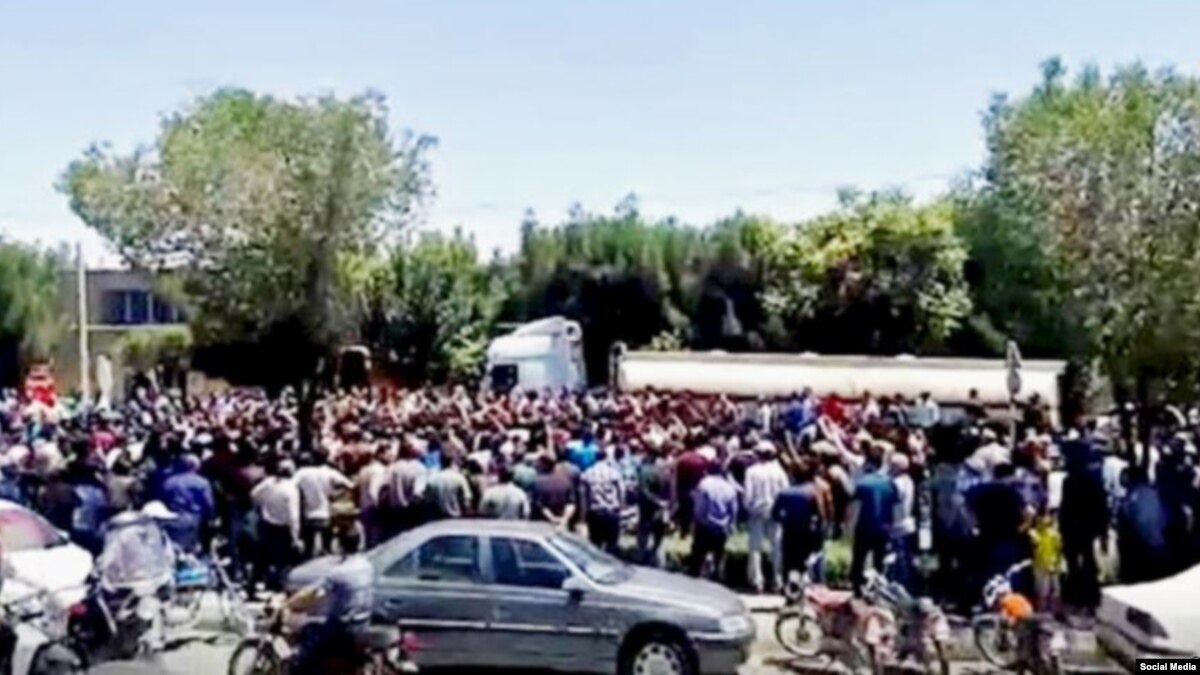
Hundreds of Iranians joined a street protest Tuesday in the central city of Isfahan to denounce the government's handling of economic problems, including the record low value of Iran's currency.
Images verified by VOA Persian and sent by Isfahan residents showed protesters marching and chanting anti-government slogans in the city's New Shapur district.
Residents said they were protesting the rial's slump to a record low against the U.S. dollar in unofficial trading this week, a decline that has raised prices for many imported products. They said the demonstration also was an expression of anger about electricity outages plaguing Isfahan in the middle of the hot summer season.
In one video clip, marchers in the New Shapur district chanted: "No to Gaza, No to Lebanon — I give my life to Iran," a common refrain of many anti-government protests across Iran this year. It is a reference to many Iranians' disapproval of the country's Islamist rulers devoting public funds to supporting Islamist militant groups across the region rather than spending those funds to tackle domestic problems.
In another clip, a man said truck drivers were among those participating in the New Shapur protest.
Other images shared on social media showed demonstrators chanting: "Reza Shah, may your soul be blessed," a reference to the late monarch whom Iran's current rulers overthrew in the 1979 Islamic Revolution. Praise for the shah also has been a regular feature of recent protests in Iran.
Residents said many New Shapur retailers shuttered their stores and joined the protest as well.
In an interview with state-controlled news agency ISNA published on Tuesday, the head of Isfahan's chamber of commerce expressed sympathy with the protesting merchants, saying most of their demands were legitimate.
Rasoul Jahangiri also called on the Iranian government to stabilize currency fluctuations so that merchants and manufacturers can plan their business activities for the coming six months.
But Jahangiri also tried to downplay the significance of Tuesday's protest, saying most of the participants were concerned with their businesses and should not be considered as part of an anti-government opposition movement. He also said his business association did not support street protests and urged merchants to present their demands through what he called legal channels.
Since December, Iran has seen frequent public protests against local and national authorities and business owners accused of mismanagement, corruption and suppressing freedoms.
This report was produced in collaboration with VOA's Persian service.
Yemen's Houthis Halt Red Sea Attacks for Two Weeks
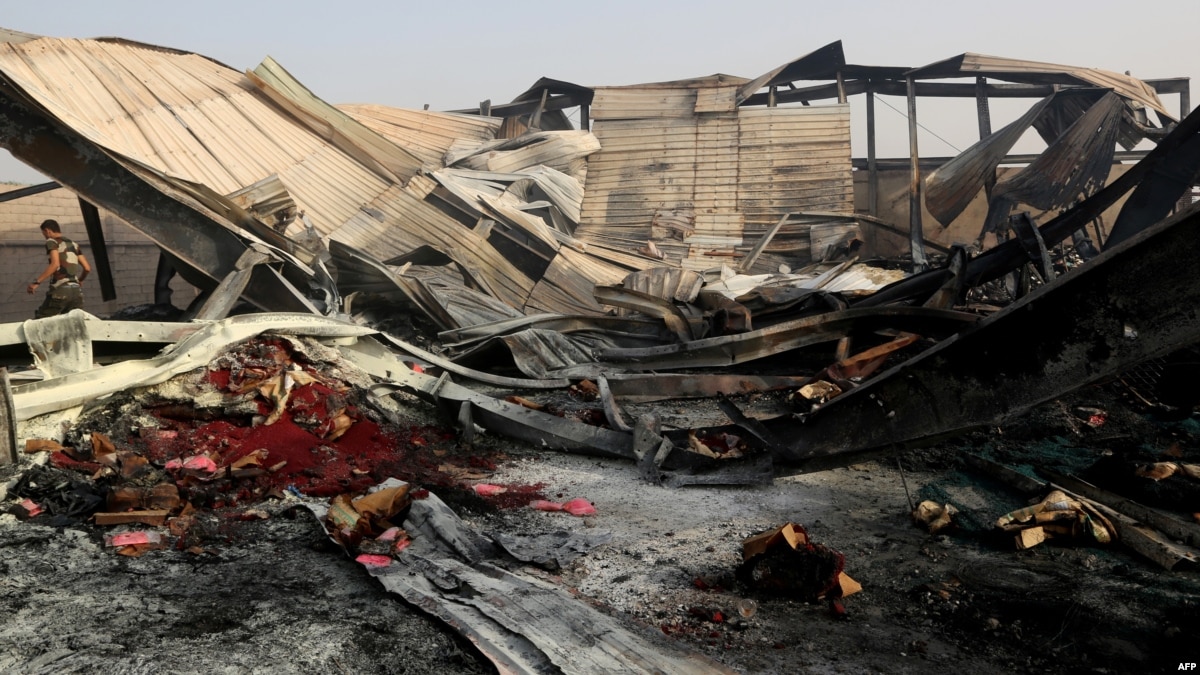
Yemen's Houthi group said Tuesday that it would unilaterally halt attacks in the Red Sea for two weeks to support peace efforts, days after Saudi Arabia suspended oil exports through a strategic Red Sea channel following attacks on crude tankers last week.
Yemen — where a Saudi-led coalition has been battling the Iranian-aligned Houthi movement in a three-year-old war — lies on one of the world's most important trade routes for oil tankers, the Bab al-Mandeb strait.
"The unilateral halt in naval military operations will be for a limited time period and could be extended and include all fronts if this move is reciprocated by the leadership of the coalition," the head of the Houthi supreme revolutionary committee, Mohammed Ali al-Houthi, said in a statement.
A statement from the Houthi-controlled defense ministry said the movement planned to halt naval operations for two weeks, starting at midnight Wednesday (2000 GMT Tuesday).
"We welcome any initiative to spare bloodshed and stop aggression against Yemen," the statement published on the state news agency SABA said, quoting a defense ministry official.
Saudi Arabia said on Thursday that it was suspending oil shipments through the strait after the Houthis attacked two Saudi oil tankers, one of which sustained minimal damage, until the waterway was safe.
Analysts say Riyadh is trying to encourage its Western allies to take the danger posed by the Houthis more seriously and step up support for its war in Yemen, where thousands of airstrikes and a limited ground operation have produced only modest results while deepening the world's worst humanitarian crisis.
A coalition spokesman did not immediately respond to a Reuters request for comment.
The Houthi leader said the group's initiative aimed to support efforts to find a political solution to the conflict, which has killed more than 10,000 people, according to the United Nations.
U.N. special envoy to Yemen Martin Griffiths has been shuttling between the warring parties to try to avert a coalition assault on the main port city of Hodeida. The U.N. fears that such an attack would risk causing a famine.
Hodeida port is the main port of the impoverished Arab country, where around 8.4 million people are believed to be on the verge of starvation.
The Western-backed coalition of Sunni Muslim Arab states intervened in Yemen's war in 2015 to restore the internationally recognized government in exile and thwart what Riyadh sees as Iran's expansionary ambitions in the region.
Flurry of Syrian Death Notices Shows Fate of Government Detainees
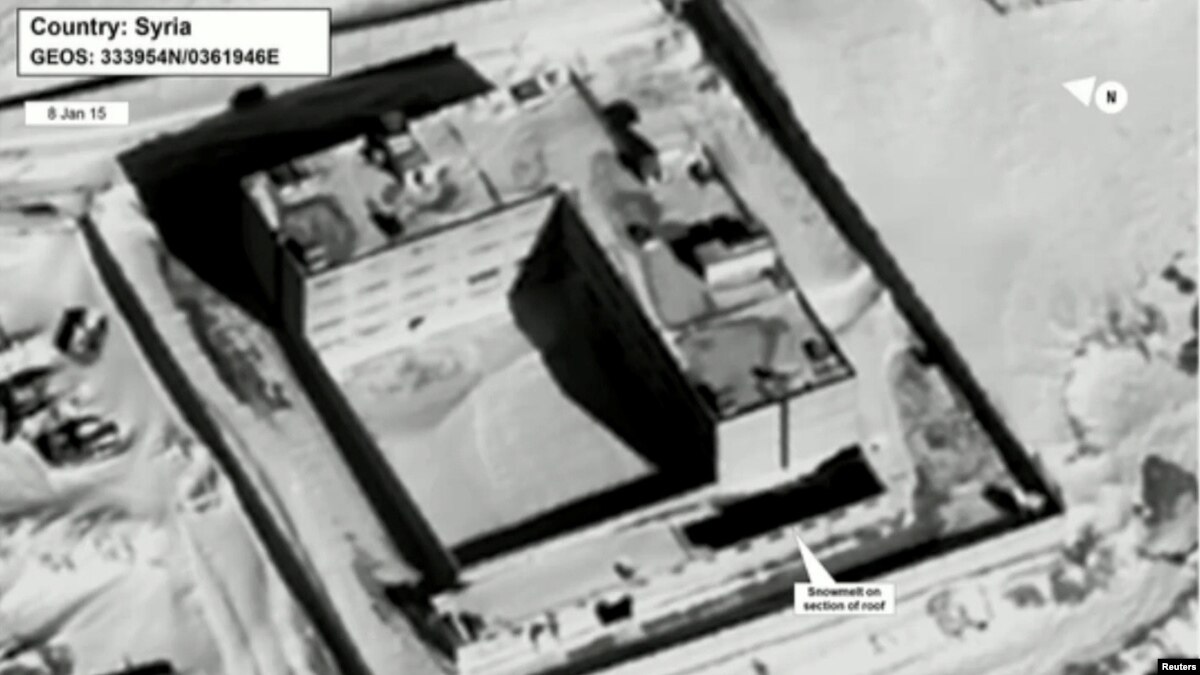
For six years Amina al-Khoulani hoped her brothers Majd and Abdelsattar were alive, albeit cut off in a Syrian government prison after their arrest early in Syria’s war.
But last week, newly published state records obtained by relatives told her the men died back in 2013, just weeks after the family last saw them through a metal fence during a visit to the Sednaya military jail near Damascus.
“We used to hear a lot of reports that they had been executed. We know that the regime is criminal and is capable of doing this but you always have hope that this is untrue.” al-Khoulani, a refugee in Britain, said in a video call.
After years of government silence about the fate of tens of thousands of people that rights groups say have been forcibly disappeared in the war, authorities have begun quietly updating registers to acknowledge hundreds of their deaths, according to Syrians who have recently learnt of their relatives’ fate.
Starting in around April, families began discovering what happened to their loved ones by chance, when they requested records from register offices, rights groups and Syrians said.
Such records are needed for many administrative tasks in Syria, so they are often sought. Only this time, the information was not what they expected — but what they had long feared.
Word spread that deaths were being acknowledged and more people began approaching registries for information.
Reuters in Beirut did not receive any response to questions faxed to the Syrian Information Ministry in Damascus. Officials at the Syrian missions in New York and Geneva could not be reached for comment.
The Syrian government last year denied a report by Amnesty International saying it had carried out a campaign of mass hangings and exterminations at Sedneya prison, calling it “devoid of truth.”
Time of death 10 p.m.
The Syrian Network for Human Rights (SNHR), which has been documenting the war from outside Syria, has recorded 532 cases of forcibly disappeared people being listed as deceased in state records in recent months, without relatives having been previously informed of their deaths.
SNHR head Fadel Abdul Ghany said the death notices were Assad’s signal to Syria that he has won.
Anwar al-Bunni, a human rights lawyer with the Berlin-based Syrian Center for Legal Research and Studies and himself a former detainee now based outside Syria, put the figure much higher. From sources inside Syria, he had so far documented 3,000 names and called this the tip of the iceberg.
“Mothers and sisters are going to see if their sons are on the lists. Those that find out drop to the ground and faint,” said 63-year-old Fadwa Mahmoud, a refugee in Germany who founded Families for Freedom which campaigns on behalf of disappeared and detained Syrians.
Mahmoud is herself awaiting news of her husband and son who were detained in 2012.
Many of the death notices on the updated register are for activists arrested in the early days of the Syrian uprising in 2011 and 2012.
And many of those came from the Damascus suburb of Daraya, one of the early centers of the uprising where rebels were finally defeated by the government in 2016 after years of siege.
“Of course the paper does not state that they died in prison ... the death is written, the date, and that is it,” said al-Khoulani. The al-Khoulani brothers' registry document, seen by Reuters, says they both died at 10 p.m. on Jan. 15, 2013.
She said her brothers had been taking part in Daraya protests calling for “freedom and dignity” — slogans of the “Arab Spring” uprisings under way across the region at the time.
Abdelsattar’s friend and fellow protester Islam al-Dabbas also died that day, al-Khoulani said. So too did prominent Daraya activist Yahya al-Shorbaji, his family — now living outside Syria — told Reuters, producing his record.
The number of Daraya residents registered as having died on the same day has led relatives to conclude they were executed together.
'I want justice’
A resident of Mouadamiya town, another early centre of the uprising, said 96 people had recently been listed as dead at the local records office. But the resident's son, missing since January 2013, was not among them.
“My heart and my hopes say he is alive, God willing, but common sense says that he has been killed with many others because he was a peaceful activist,” the resident said. SNHR has documented at least 85,036 people forcibly disappeared across Syria since the start of the war.
Around 90 percent are thought to have been taken by government security agencies, the rest by factions operating in Syria’s chaotic multi-sided war, it said.
Backed by Russia and Iran, Assad’s advances have accelerated this year with rebels now posing no military threat to his rule.
Assad’s ally Russia is urging refugees to come home, saying there is nothingto fear from Assad’s government.
But people continue to flee areas that are falling back under its control, and many refugees say they are scared to return, fearing arrest, conscription or worse.
Syrian opposition officials and Turkey, which backs them, have pushed for the issue of detainees and the forcibly disappeared to be discussed in peace talks that have made no progress.
“They forced us out of our homes, took our money and killed our children,” said the mother of the al-Khoulani brothers from her exile in Britain. “I want justice.”
Read More Flurry of Syrian Death Notices Shows Fate of Government Detainees : https://ift.tt/2Ou5BgmAmal Clooney Scholarship Winner Aims to Fight Child Marriage and Rape
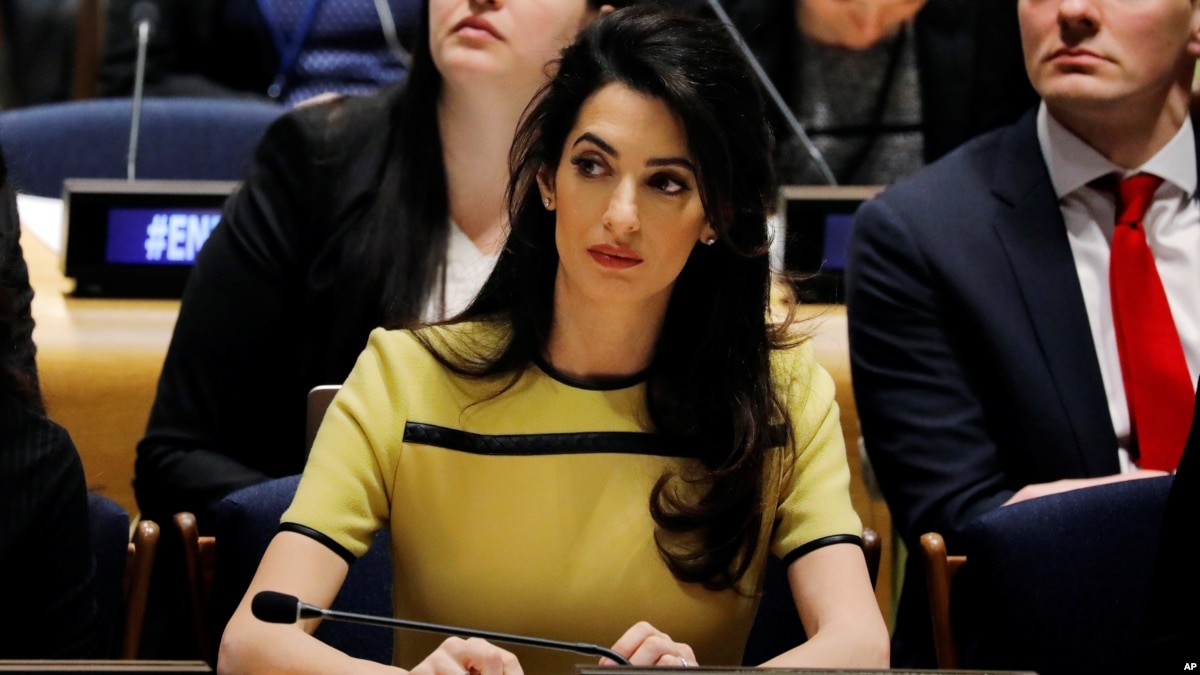
The 16-year-old winner of the annual Amal Clooney Scholarship said on Tuesday that she wants to combat child marriage and marital rape in Lebanon, where there is no minimum age to wed.
Kamar Omary will head to Armenia's UWC Dilijan College in August to enroll in its two-year international baccalaureate program — the fourth Lebanese teenager to receive the award set up by the prominent Lebanese-British human rights lawyer.
"We need a minimum age for marriage and marital rape should be criminalized," Omary told Reuters by phone from Lebanon. "Sexism and abuse of women and children is still widespread. ... Women are stigmatized. They are generally seen as weaker than men and we need change."
Religious communities' personal status laws in Lebanon allow girls younger than 15 to marry, leading many Syrian refugee families, who cannot afford food or rent, to marry off their young daughters, rights groups say.
Clooney, a London barrister, is known for representing Yazidi women who have been victims of sexual slavery, rape and genocide by Islamic State militants in Iraq, and for her marriage to Hollywood star George Clooney.
Omary said she hopes to follow in Amal Clooney's footsteps of fighting for "people in need," such as some 1 million Syrian refugees in Lebanon, most of whom live in poverty.
"Every single person deserves education, health and security, and most refugees don't get that here. That is very unfair," Omary said. "I want to connect with people and listen to them — that is how you trigger change and that is what Amal does. She listens to the people and defends them."
Amal Clooney Scholarship winners are chosen based on their academic performance and interest in the promotion of human rights and international issues.
World Bank Warns Some Lebanon Projects Might Be Cancelled
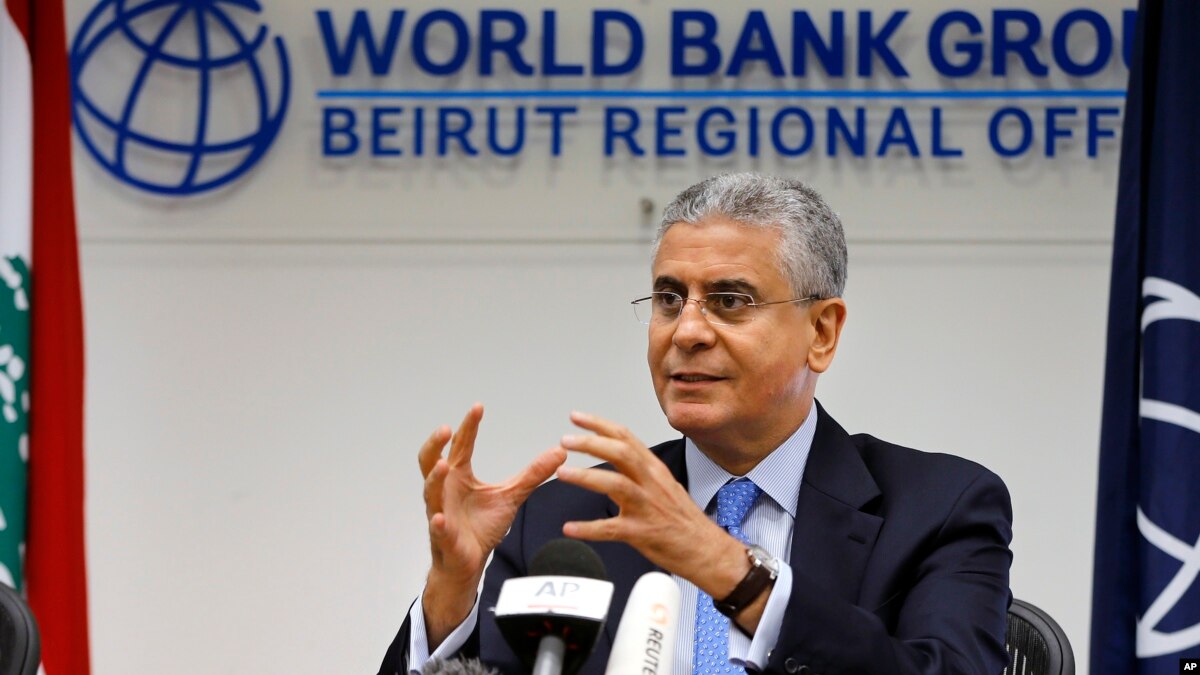
A senior World Bank official said Tuesday that the Lebanese economy is “not doing great” and urged the country’s leaders to approve some $1.1 billion worth of projects put forward by the international lender, saying otherwise they could be cancelled.
Ferid Belhaj, the bank’s vice president for the Middle East and North Africa, told reporters in Beirut that the economy is “in a state of fragility.”
Lebanon’s economy has suffered from the seven-year civil war in neighboring Syria, which has caused occasional spillovers of violence and has sent more than 1 million refugees across the border. Syrian refugees now make up about a quarter of Lebanon’s population.
The refugees’ presence has been a burden on Lebanon’s already crumbling infrastructure. Power outages are common, and many residents must have water brought to their homes by tanker truck.
Belhaj said Lebanon should take steps to reform the electricity sector, where the state-owned provider operates on a $1.5 billion annual deficit.
Corruption-plagued Lebanon has one of the highest debt ratios in the world, worth $80 billion, or 152 percent of the gross domestic product, and growth has been slow since 2011.
$2 billion worth of projects
Belhaj said the World Bank has a portfolio of more than $2 billion of projects in Lebanon, including about $1.1 billion which is still “not converted into actual investment, meaning they are sitting with parliament and the council of ministers.”
He said the World Bank wants to make sure that projects move forward, not only because Lebanon needs them, but because the government is paying commitment fees on them. He said that if the projects are not approved by the government and parliament they will have to be canceled.
“This is not our preference, obviously. We would really want to have these projects move ahead as soon as possible,” he said.
Saroj Kumar Jha, the World Bank’s regional director for the Mashreq, or Middle East, said the projects include improving roads in rural areas, building rapid bus transit across Beirut and improving the electricity sector.
Prime Minister-designate Saad Hariri has been trying to form a Cabinet since after the May 6 parliamentary elections, with no success due to political bickering.
Banks reportedly blackmailed
Also Tuesday, Lebanese media reported that Iraqi intelligence in collaboration with the Lebanese General Security have revealed a scam network spreading false information to blackmail a number of Lebanese banks, including one of the country’s largest.
Investigations were continuing, and the head of Lebanon’s General Security, Abbas Ibrahim, told reporters in Beirut the plot was to undermine Lebanon’s banking sectors, one of the country’s economic pillars.
Iraqi intelligence has reportedly arrested some members of the network, who had falsely claimed they had accounts in Lebanese banks worth millions of dollars.
Israel Jails Arab Poet for Online 'Incitement to Terrorism'
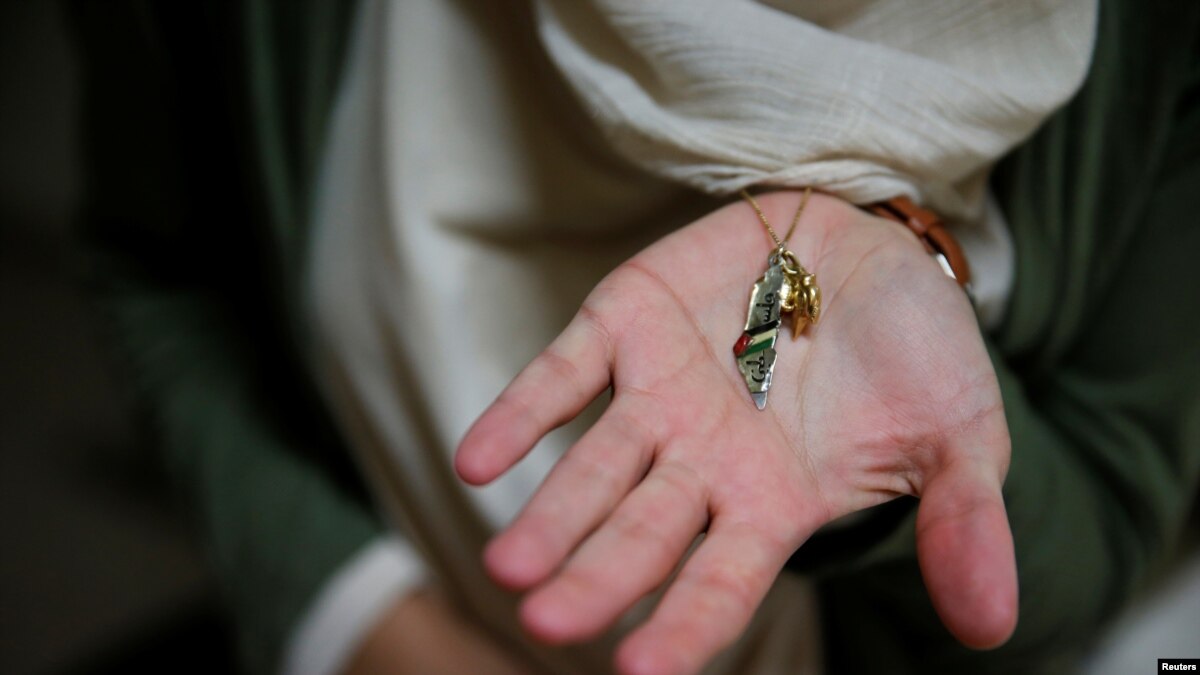
An Israeli court jailed an Israeli Arab poet for five months on Tuesday after convicting her of incitement to terrorism for a poem and remarks she posted on social media during a wave of Palestinian street attacks.
Dareen Tatour, 36, posted on Facebook and YouTube a video of herself reading out her poem “Resist, My People, Resist”, as a soundtrack to footage of masked Palestinian youths throwing stones and firebombs at Israeli soldiers.
Tatour published her poem in October 2015 during a spate of deadly Palestinian stabbing, shooting and ramming attacks on Israelis. She was arrested a few days later, and prosecutors said her post was a call for violence. She denied this.
Her case became a cause celebre for freedom of speech advocates in Israel and abroad. It drew attention to the advanced technology used by Israeli security agencies to trawl through social media to identify and arrest users suspected of incitement to violence, or of planning attacks.
Tatour said her poem was misunderstood by the Israeli authorities as it was not a call for violence, rather for non-violent struggle.
U.S.-backed negotiations on a Palestinian state in territory Israel captured in a 1967 war have been stalled since 2014.
Tatour was also charged with supporting a terrorist group. Prosecutors said she had expressed support for the Palestinian militant group Islamic Jihad’s call for an uprising.
“I wasn’t expecting justice to be done. The case was political from the start, because I am Palestinian and support freedom of speech,” she told reporters at the Nazareth Magistrate’s Court in northern Israel.
Arab minority
Tatour belongs to Israel’s Arab minority, which comprises mainly descendants of the Palestinians who remained on their land after the 1948 Arab-Jewish war that surrounded the creation of the state of Israel. Hundreds of thousands fled or were driven from their homes.
The court added a six-month suspended sentence to Tatour’s jail time, according to the official minutes distributed by the Justice Ministry. Her lawyer, Gaby Lasky, said Tatour would appeal both the verdict and the sentence.
Israel says the string of Palestinian attacks that began in 2015 was fueled by online incitement and it has launched a legal crackdown to curb it.
Indictments for online incitement have tripled in Israel since 2014. Prosecutions by the Israeli military have also increased in the occupied West Bank - most of those charged are young Palestinians.
The campaign against alleged incitement has raised questions about the balance between security and free speech.
On July 18 the Israeli parliament was set to pass legislation that would have empowered the justice system to order Internet providers, such as Facebook and Google, to take down social media posts in Israel deemed as incitement.
But hours before the scheduled vote Prime Minister Benjamin Netanyahu shelved the bill. An adviser to Netanyahu, Jonatan Urich, said the law was open to a too-wide interpretation that could allow cyber-censorship and harm freedom of speech.
Tehran: Trump Wrong to Expect Saudis to Cover Loss of Iran Oil Supply
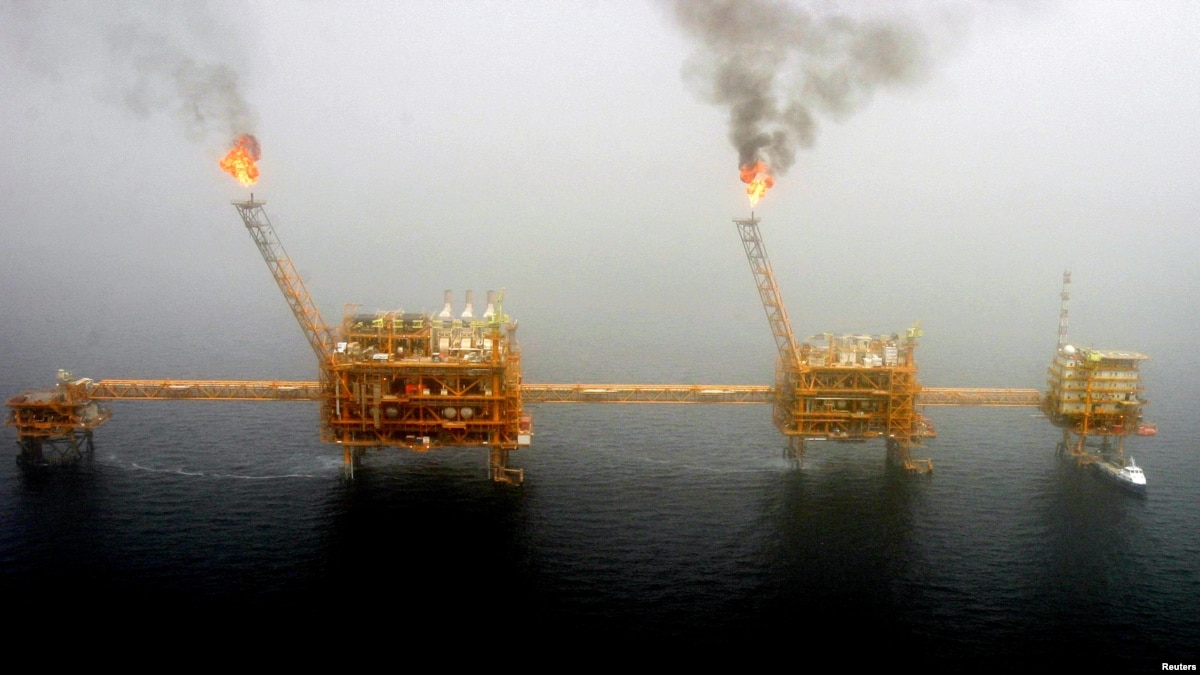
Iran said on Tuesday U.S. President Donald Trump was mistaken to expect Saudi Arabia and other oil producers to compensate for supply losses caused by U.S. sanctions on Iran, after OPEC production rose only modestly in July.
The comments, from Iran's OPEC governor, came a day after a Reuters survey showed OPEC production rose by 70,000 barrels per day in July. Saudi production increased but was offset by a decline in Iranian supply due to the restart of U.S. sanctions, the survey found.
"It seems President Trump has been taken hostage by Saudi Arabia and a few producers when they claimed they can replace 2.5 million barrels per day of Iranian exports, encouraging him to take action against Iran," Hossein Kazempour Ardebili told Reuters. "Now they and Russia sell more oil and more expensively. Not even from their incremental production but their stocks."
He said oil prices, which Trump has been pressuring the Organization of the Petroleum Exporting Countries to bring down by raising output, will rise unless the United States grants waivers to buyers of Iranian crude.
"They are also calling for the use of the U.S. SPR [Strategic Petroleum Reserve]. This will also mean higher prices. U.S. waivers to our clients if they come is due to the failure of bluffers [Saudi and the other producers] and, if not given, will again push the prices higher," he said.
"So they hanged him [Trump] on the wall. Now they want to have a mega OPEC, congratulations to President Trump, Russia and Saudi Arabia."
OPEC governors represent their respective country on the organization's board of governors and are typically the second most senior person in a country's OPEC delegation after the oil minister.
"The longer-term solution, Mr President, is to support and facilitate capacity building in all countries, proportionate to their reserves of oil and gas. And we will remain the biggest opportunity," Kazempour said.
Iranian Adviser: US Must Return to Nuclear Deal for Talks
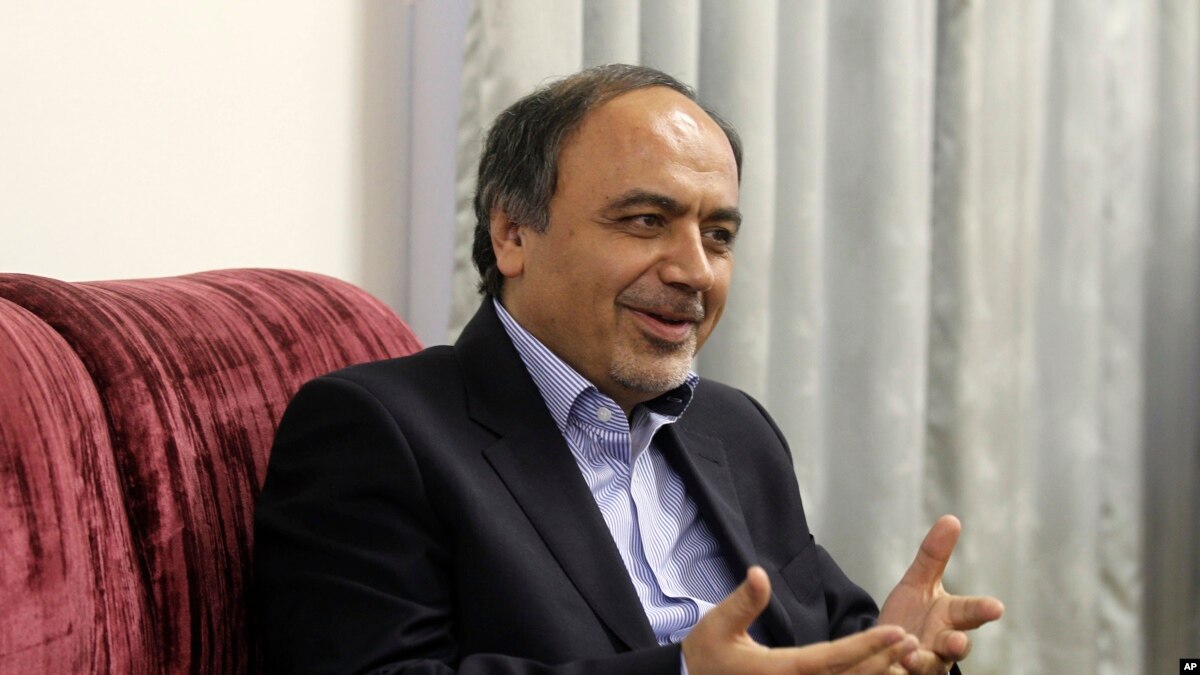
An adviser to Iranian President Hassan Rouhani says if President Donald Trump wants talks, he needs to rejoin the international nuclear deal that he unilaterally pulled out of earlier this year.
Trump on Monday said he'd meet with Rouhani if the Iranian leader were willing.
Iranian leadership has previously ruled out one-on-one talks with Trump after his decision to pull the United States out of the deal under which Iran was given relief from sanctions in return for curbs on its nuclear program.
Iran's semi-official ISNA news agency quoted political adviser Hamid Aboutalebi as saying Tuesday that for talks to happen, the U.S. needs to rejoin the deal.
Aboutalebi says "those who believe in dialogue as a method of resolving disputes in civilized societies should be committed to the means."
Monday, July 30, 2018
Trump: Would Meet Iran's Leaders With 'No Preconditions'
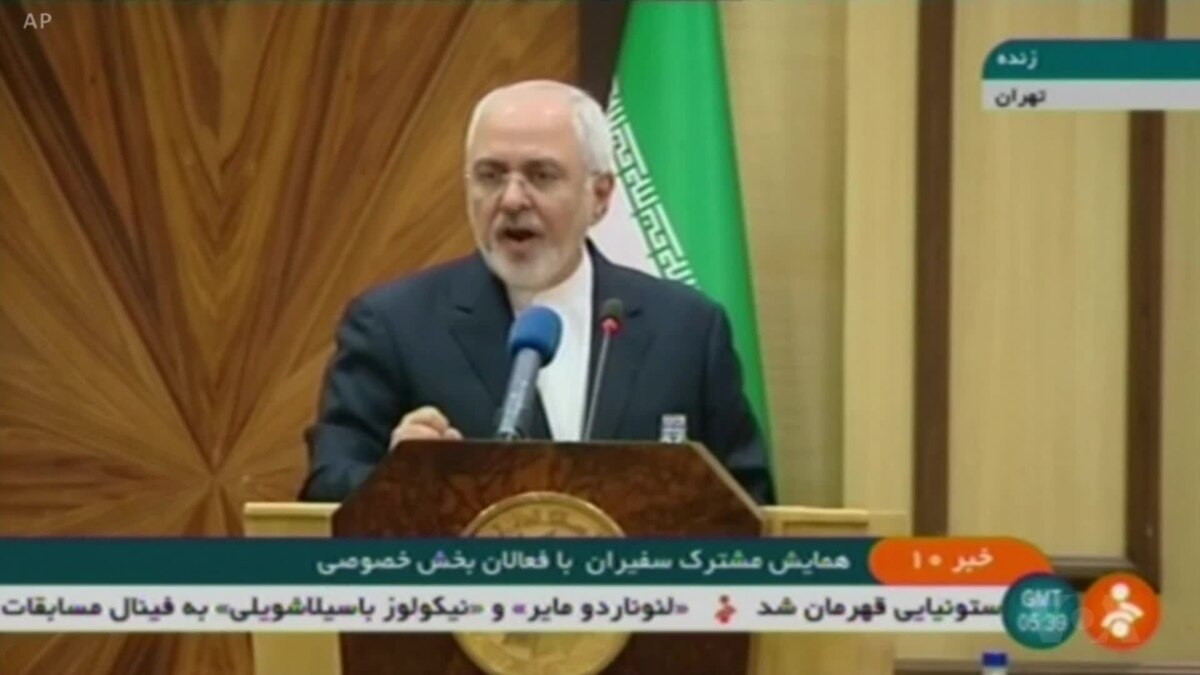
President Donald Trump says he is willing to meet with Iran's leaders with "no preconditions" and "any time they want." But at a news conference Monday, he also said Iran's "brutal regime" must never be allowed to acquire nuclear weapons. Last week, Trump exchanged heated rhetoric with Tehran, warning the Iranian president to "never, ever" threaten the United States again. VOA's Zlatica Hoke reports.
Read More Trump: Would Meet Iran's Leaders With 'No Preconditions' : https://ift.tt/2NXuNe2Italy's PM Plans to Organize Conference on Stabilizing Libya
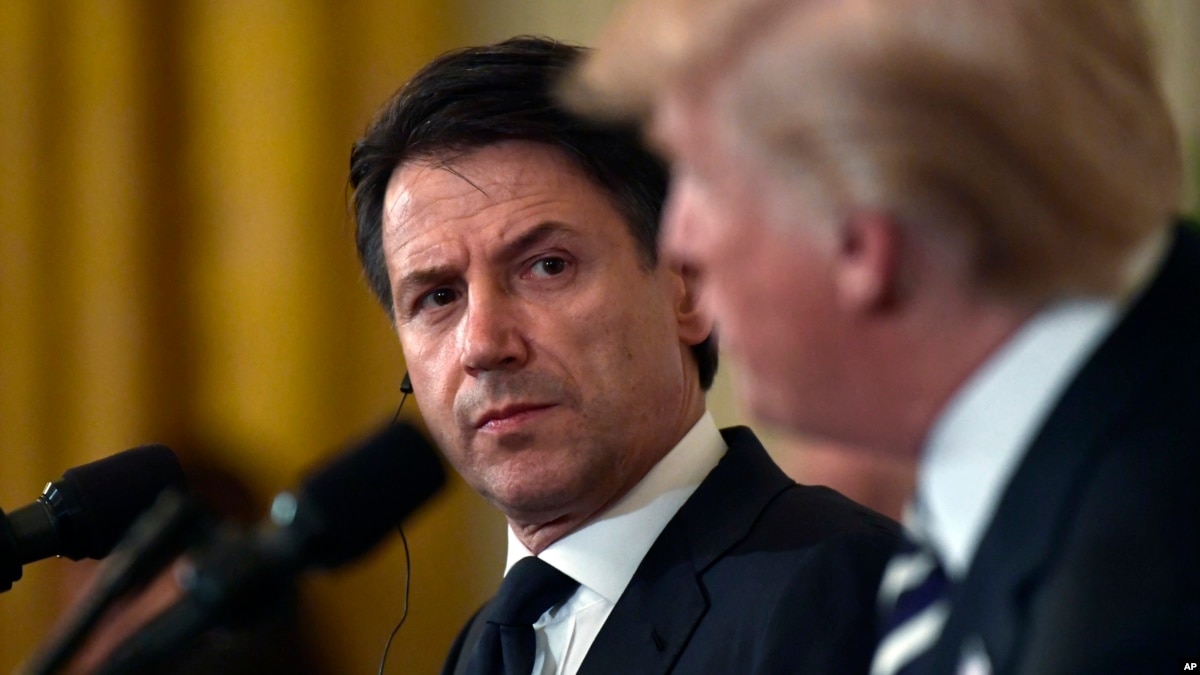
Italian Prime Minister Giuseppe Conte said on Monday he was organizing a conference to look for ways to stabilize Libya, a main departure point for migrants from North Africa trying to reach Europe.
"In agreement with President (Donald) Trump, I'm going to organize a conference on Libya," Conte told reporters at the White House after meeting with the U.S. president.
"We would like to deal (with) and discuss all of the issues related to the Libyan people, involving all of the stakeholders, actors, protagonists in the whole of the Mediterranean," said Conte, who took office last month promising a crackdown on immigration.
Italy has told its allies it wants to hold an international conference on Libya this autumn and Conte was eager to get Trump's blessing for the gathering at their meeting on Monday.
Italy is competing with neighboring France over how best to deal with Libya, which has been wracked by violence for years.
Conte believes a conference in Rome, backed by the United States, will help Rome establish itself as the major interlocutor for Libya's warring factions.
After their meeting, Conte said Trump had agreed Italy would become "a reference point in Europe and the main interlocutor for the main issues that need to be faced ... with particular reference to Libya."
"We are going to discuss economic aspects, but also social aspects: the need for protection of civil rights; the problem of constitutional process - of issuing and passing laws so as to enable Libya, in particular, to get to democratic elections in a condition of the utmost stability," Conte said.
Lawyer: US Pastor Appeals for Release, Lifting of Travel Ban
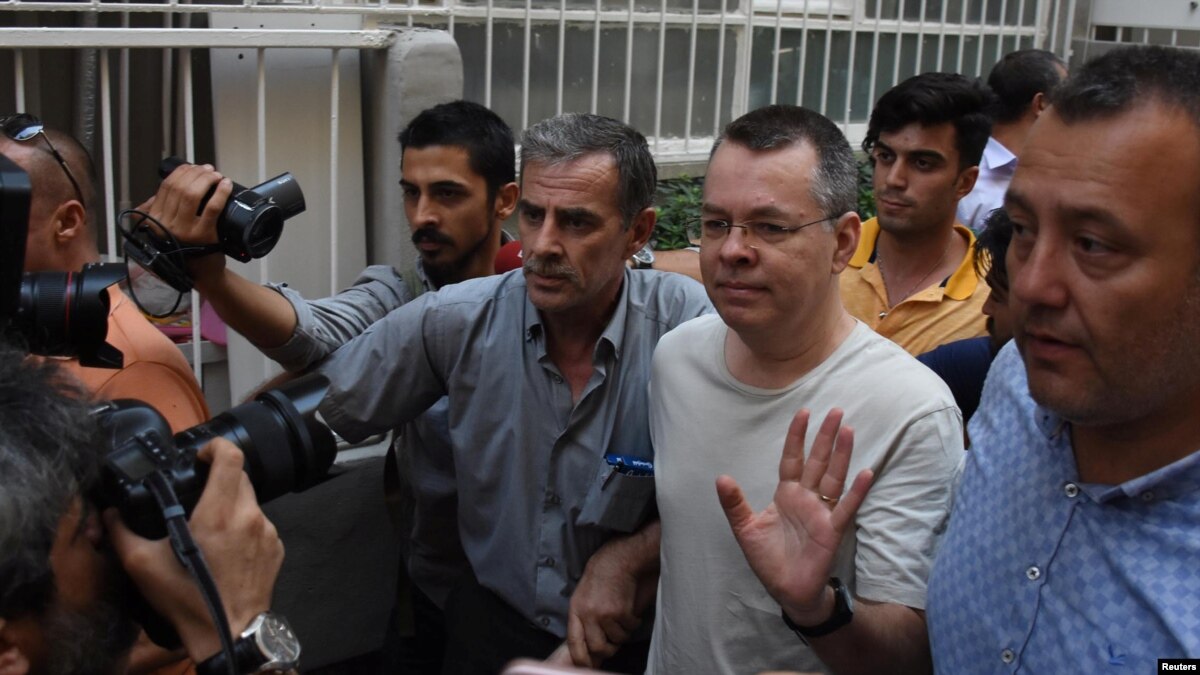
A Christian American pastor standing trial in Turkey on terrorism charges has appealed to a Turkish court to release him from house arrest and lift his travel ban, his lawyer told Reuters on Monday.
Relations between Turkey and the United States have spiraled into a full-blown crisis over the trial of pastor Andrew Brunson, who was in custody for 21 months in a Turkish prison until he was transferred to house arrest last week.
President Donald Trump last week threatened to impose "large sanctions" on Turkey unless it frees Brunson, who is accused of helping the group Ankara says was behind a failed military coup in 2016. Brunson faces up to 35 years in jail if found guilty of the charges, which he denies.
The appeal document seen by Reuters said although Brunson was freed from jail, the pastor was still deprived of his freedom and was unable to return to his normal life and carry out his religious duties.
Brunson's lawyer Ismail Cem Halavurt said it would take the Turkish court in Aegean province of Izmir, where Brunson stood trial, three to seven days to make a decision on the appeal request.
His next hearing as part of the trial is scheduled for October.
Brunson was accused of helping supporters of Fethullah Gulen, the U.S.-based cleric who Turkish authorities say masterminded the coup attempt against President Tayyip Erdogan in which 250 people were killed. He was also charged with supporting outlawed PKK Kurdish militants.
Gulen denies any involvement in the coup attempt. Speaking to reporters during his trip to South Africa, Erdogan said Turkey would stand its ground in the face of Trump's sanctions threat.
It was not clear what would be the nature of sanctions threatened by Trump but Washington was already working on bills related to Turkey.
The U.S. Senate has demanded a block on sales of F-35 jets to Turkey unless Trump certifies that Turkey is not threatening NATO, purchasing defense equipment from Russia or detaining U.S. citizens.
In Iran, Economic Worries Grow as New US Sanctions Loom
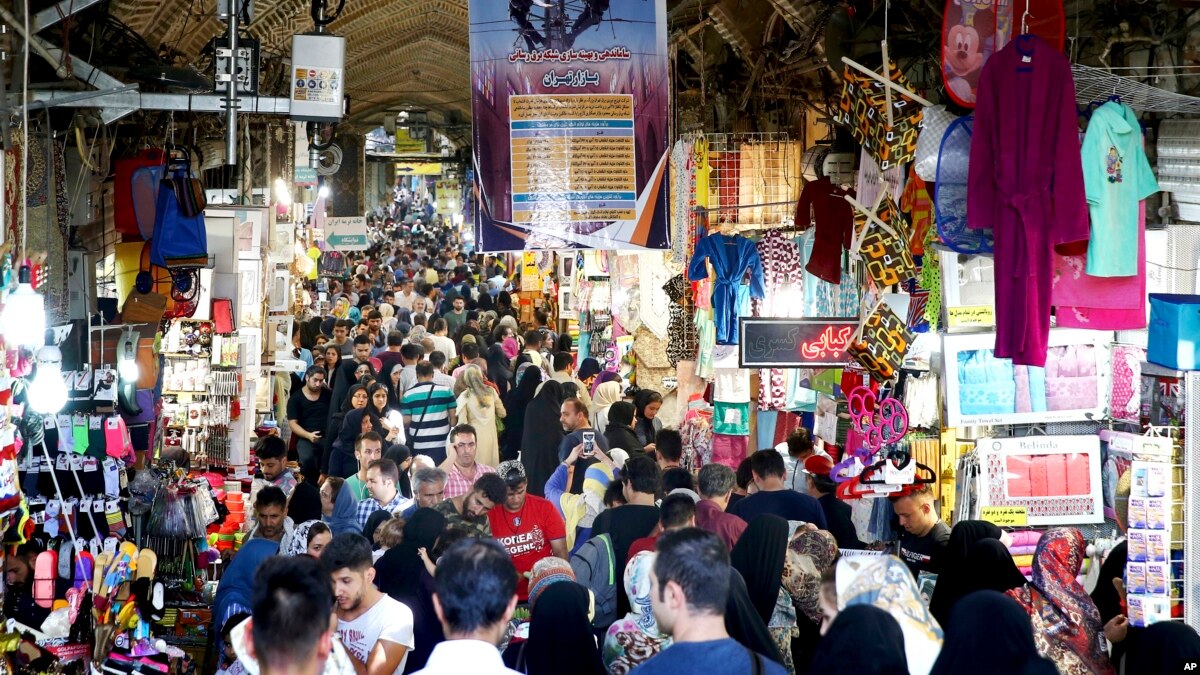
Iran's currency has dropped to a record low ahead of the imposition of renewed American sanctions, with many fearing prolonged economic suffering or possible civil unrest.
The rial dropped to 122,000 to the dollar on the thriving black market exchange Monday, from the previous low set the day before of 116,000.
Already last month, protesters clashed with police outside parliament in Tehran amid three days of demonstrations sparked by the currency's plunge, and worries are growing about what might happen once the new sanctions kick in August 6.
The central bank on Monday blamed the currency's free fall on ``the enemies' conspiracies.''
President Donald Trump's administration announced the restoration of sanctions after he withdrew the U.S. from the Iran nuclear deal in May.
Syrian Forces Press Offensive Despite IS Threats to Hostages
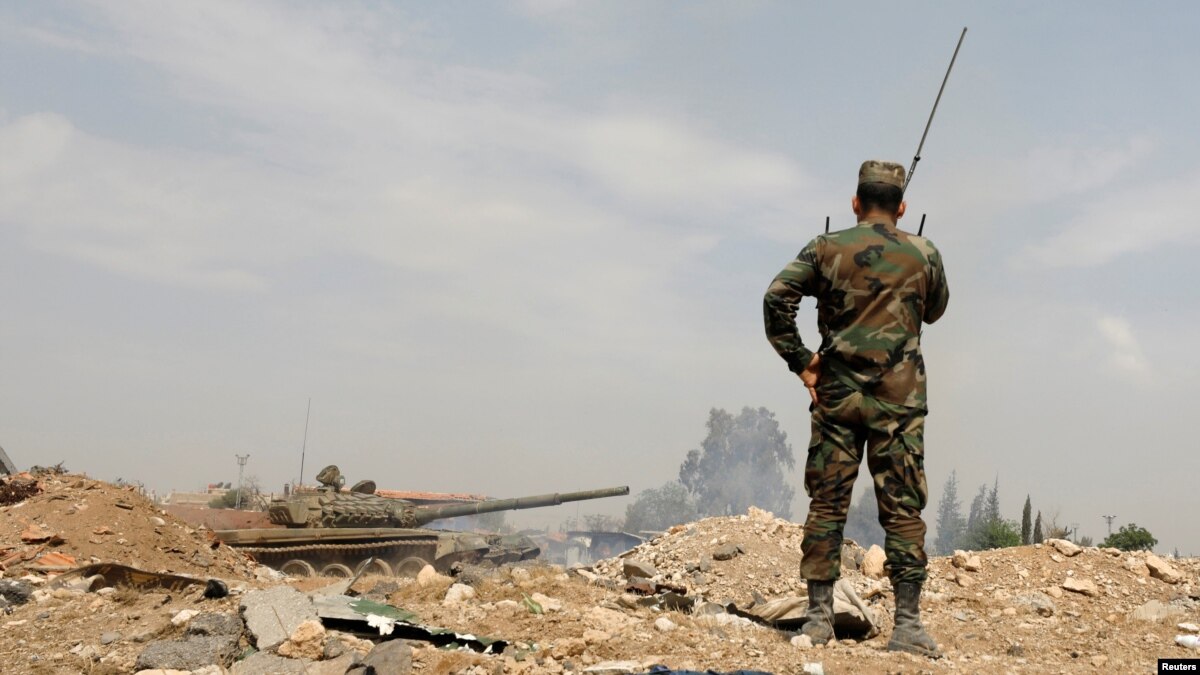
Syrian government forces pressed ahead with their offensive in the country's south on Monday despite threats by the Islamic State group to kill civilians it recently captured there.
Syrian state TV and the Britain-based Syrian Observatory for Human Rights, an opposition-linked war monitoring group, both reported government attacks on the Yarmouk basin region in southern Syria.
The area is controlled by a group linked to IS that has been in retreat in recent weeks near the border with Jordan and the frontier of the Israeli-occupied Golan Heights.
Syrian state TV aired live footage from the area in which troops pounded IS positions with multiple rocket launchers.
The Observatory reported that government helicopter gunships pounded several villages held by IS, including Shajara, Abdeen and Koya.
The Observatory said some 4,000 civilians are still present in the small pocket controlled by IS-linked fighters.
The government-controlled Syrian Central Military Media said that government forces and their allies entered the IS stronghold of Shajara from two fronts on Monday, without giving further details.
The Observatory said the offensive resumed Monday after a day of relative calm following the release of a video on Saturday in which a woman said she was being held with other women. The woman said they could be freed if the government releases IS detainees and halts the offensive. She said if the demands were not met the militants would kill the captives.
The extremists abducted around 18 people, mostly women, in a wave of attacks in the nearby province of Sweida last Wednesday that killed more than 200 people.
The Sweida 24, an activist collective in Sweida, said IS sent the photos of 14 women they are holding to their relatives, saying they want to negotiate over them.
Sweida 24 said IS is believed to be holding 30 people, including 20 women whose ages range between 18 to 60. It said IS is also believed to be holding 16 young boys and girls.
The activist group said the bodies of two women were found near the village of Shabki, a focus of Wednesday's attack. One had been shot in the head and the other, an elderly woman, apparently died of exhaustion. Four other women were found alive hiding in a cave, it said.
Those abducted are members of the minority Druze sect. The Druze, followers of an esoteric offshoot of Islam, have kept their own local militias in the area. The Sunni Muslim extremists of IS view them as apostates, and have a history of abducting members of other religious minorities and keeping women as sex slaves.
Until Wednesday, Sweida, home to a predominantly Druze community, had largely been spared from Syria's seven-year-long civil war.
IS has been driven from virtually all the territory it once controlled in Syria and Iraq, but holds scattered pockets of territory in southern Syria and along the border.
Sunday, July 29, 2018
Witnesses: Heavy Fighting Near Yemen's Hodeida Kills Dozens
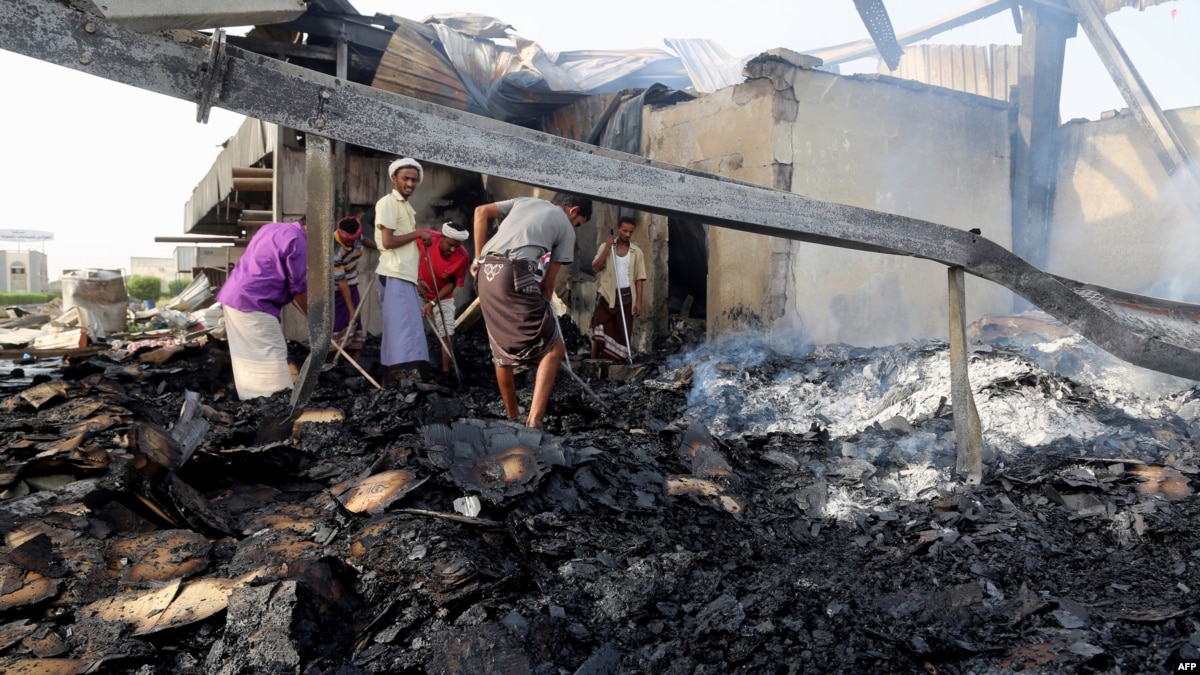
Heavy fighting along Yemen's west coast between pro-government forces and Shiite rebels in recent days has left dozens dead from both sides, Yemeni officials and witnesses said Sunday.
Government forces, backed by a Saudi-led coalition, have been advancing in the area in recent weeks as they battle Iran-allied rebels known as Houthis. The fighting has escalated as government forces try to retake the port city of Hodeida, the main entry point for food in a country teetering on the brink of famine.
The government has been waging an offensive to seize the rebel-held district of Zabid south of Hodeida, the officials said. The offensive is being waged by ground troops carrying sophisticated weapons, including shoulder-fired missiles, with air cover from the Saudi-led coalition, they said.
The fighting to capture Zabid, a UNESCO World Heritage Site, killed dozens from both sides of Yemen's conflict, now in its fourth year.
The coalition on Sunday targeted rebels in the district of ad-Durayhimi south of Hodeida with airstrikes, killing at least 18 people, the officials said. The rebels, known as the Houthis, were trying to break into ad-Durayhimi, about 20 kilometers (12.5 miles) south of Hodeida International Airport, they said.
The officials spoke on condition of anonymity because they were not authorized to brief the media, while the witnesses did so for fear of reprisals.
United Nations Human Coordinator for Yemen Lise Grande said airstrikes hit and damaged a sanitation facility in Zabid and a water station that supplies the majority of the water to the city of Hodeida.
"These airstrikes are putting innocent civilians at extreme risk," she said. "Damage to sanitation, water and health facilities jeopardizes everything we are trying to do. We could be one airstrike away from an unstoppable epidemic."
Also on Sunday, the coalition said it destroyed missile launch sites in the rebels' northern home base of Saada province, according to a statement carried by the Saudi state-run al-Ekhbariya TV channel.
The Saudi-led coalition launched the campaign to retake Hodeida in June, with Emirati troops leading the force of government soldiers and irregular militia fighters backing Yemen's exiled government. Saudi Arabia has provided air support, with targeting guidance and refueling from the United States.
Hodeida, home to 600,000 people, is some 150 kilometers (90 miles) southwest of the capital Sanaa. The campaign to take Hodeida threatens to worsen Yemen's humanitarian situation as it is the main entry point for food, humanitarian aid and fuel supplies to the country.
Aid groups fear a protracted fight could force a shutdown of the port and potentially tip millions into starvation. Some 70 percent of Yemen's food enters via the port, as well as the bulk of humanitarian aid and fuel supplies. Around two-thirds of the country's population of 27 million relies on aid and 8.4 million are at risk of starving.
The Houthis seized control of Sanaa in September 2014, and later pushed south toward the port city of Aden. The Saudi-led coalition entered the conflict in March 2015 and has faced criticism for a campaign of airstrikes that has killed civilians and destroyed hospitals and markets.
The Houthis, meanwhile, have laid land mines, killing and wounding civilians. They have also targeted religious minorities and imprisoned opponents. The stalemate war has killed more than 10,000 people.
Impoverished Yemen has been devastated by the stalemated three-year civil war that has left around two-thirds of Yemen's population of 27 million relying on aid, and over 8 million at risk of starving.
Saturday, July 28, 2018
Detained Syrian Women Face Stigma Upon Release
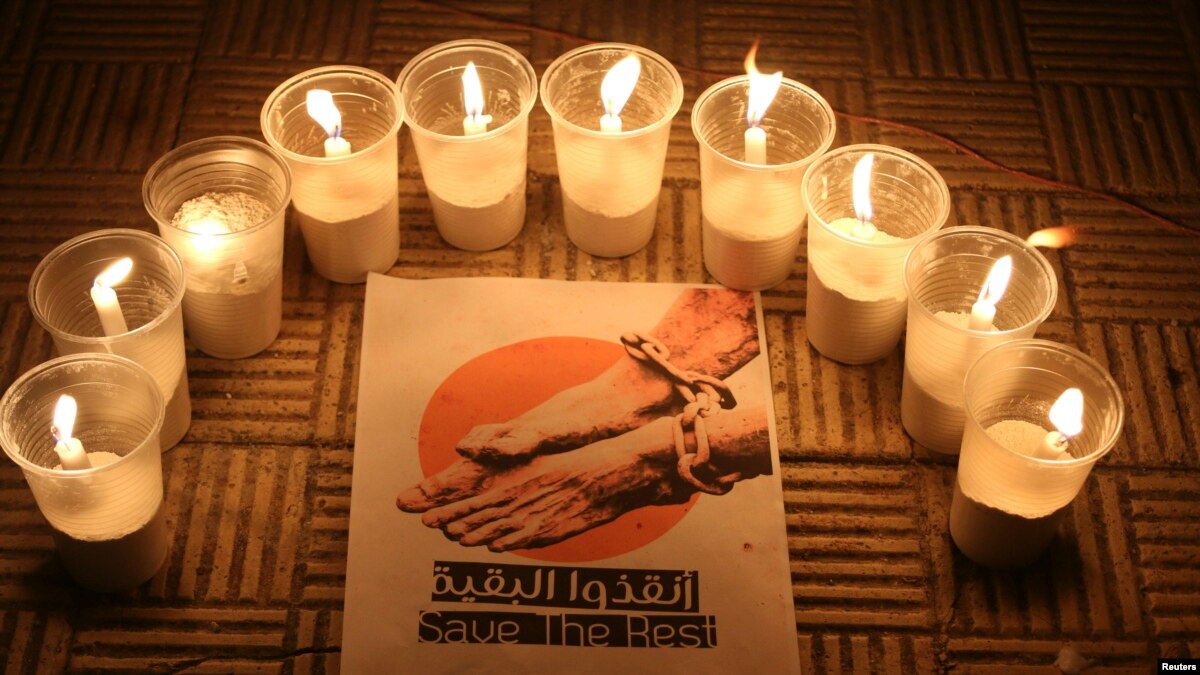
Sundus Filfleh, a schoolteacher and a mother from Latakia city in western Syria, struggles to support her two girls and overcome the stigma of serving time in prison for her civil activism.
"After I was released from prison, the first question people asked me was whether I was raped," Filfleh told VOA. "Society looks at a released woman in a suspicious way. There is a social rejection of the women who are released from prison."
Syrian government forces arrested Filfleh during a peaceful protest in 2011 as she was trying to escape with other anti-government protesters. She said security forces opened fire on unarmed peaceful protesters to disperse their gathering.
She was imprisoned for about a year by the Syrian regime for her civil activities.
She said prison profoundly changed the way her family and other people view her as a person.
"My husband never accepted me again. We were separated after I was released. A lot of inmates were abandoned by their spouses and families after they were released as well," she said.
Filfleh said her family members tried to her get out of prison, but turned their backs on her when she was released.
Torture and delivery
Filfleh was pregnant with her daughter when she was arrested, and she gave premature birth to her child inside the prison as a result of severe beating and torture by prison guards.
Now out of prison, Filfleh tries to find meaning and purpose in life. She lives in northern Syria's Idlib province, one of the last rebel held strongholds in Syria. She works as a social worker, helping other women who went through gender-based violence during the country's war.
But social work brings its own challenges, and she fears that her work might provoke extremist groups who disapprove of women's activism and advocacy for rights.
"Surviving the experience of detention took fear out my heart. We must fight back this extremist thought," Filfleh said.
A recent U.N. report said Syrian women have suffered many abuses, including sexual violence, torture and trauma, by different warring factions in the country.
The report also echoed Fifleh's experience that prison takes a heavy toll on inmates and changes women's lives forever.
"Owing to social norms and honor codes, however, men tend to be celebrated by their community upon their release, whereas women face shame, stigma and rejection by husbands or parents, who assume that they were raped in custody," the report said.
Gülden Sönmez, a lawyer who organized the Conscience Convoy, an all-female march, in Turkey's border region with Syria earlier this year, told Turkish media outlets that about 14,000 women had been imprisoned by the Syrian regime and that most of them had died because of torture and abuse.
A cause
Rejection by the community has prompted abandoned Syrian women to band together to help heal some of psychological trauma. Some have established organizations to help former prisoners raise awareness their situation and experiences.
Walaa Ahmad, a former prisoner and founder of the Idlib-based Release Me Foundation, started her nonprofit organization to provide psychological healing and education for women who suffered during and after detention in Syria.
"The greatest challenge these women face is the acceptance of society. Many of these women are divorced by their husbands, neglected by their parents, and found themselves cut off without a place to live," Ahmad said.
"Some of these women are imprisoned with their children, and this creates a greater pressure on them after their release from prison," Ahmed added.
Ahmed was arrested in late 2014 for her civil activism and was finally released in early 2017. She said she was arrested at a military checkpoint by government forces and taken to the notorious Adra prison in northeast Damascus.
Ahmed was hesitant to go into the details of her experience in prison, but like Filfleh, she finds comfort in helping other women with similar experiences overcome their struggles in post-prison life.
140,0000 detainees
The Syrian Observatory for Human Rights, a U.K.-based rights group monitoring developments in Syria since 2011, has documented more than 140,000 cases of people being detained by the Syrian regime.
The group charges that detainees have been subject to torture and that nearly 15,000 people, including women and children, have died as a result.
The group also says the 15,000 figure represents only cases that can be documented. It says the actual number of detainees who died in government prisons could be several times higher.
VOA could not independently verify the authenticity of these figures.
Many international organizations are urging the Syrian government to release prisoners incarcerated by the regime during the country's civil war, which broke out in 2011.
In March 2017, Zeid Ra'ad Al Hussein, the U.N. high commissioner for human rights, told a Geneva forum that in order for the Syrian people to find peace, there must be accountability and justice.
"Today, in a sense, the entire country has become a torture chamber, a place of savage horror and absolute injustice," Al Hussein said.
Syrian local sources said that the fate of thousands of Syrian detainees might be revealed as the government regains most of the land it lost to various rebel groups in the past few years.
Read More Detained Syrian Women Face Stigma Upon Release : https://ift.tt/2Luw0gdThird Palestinian Dies After Friday Border Protests
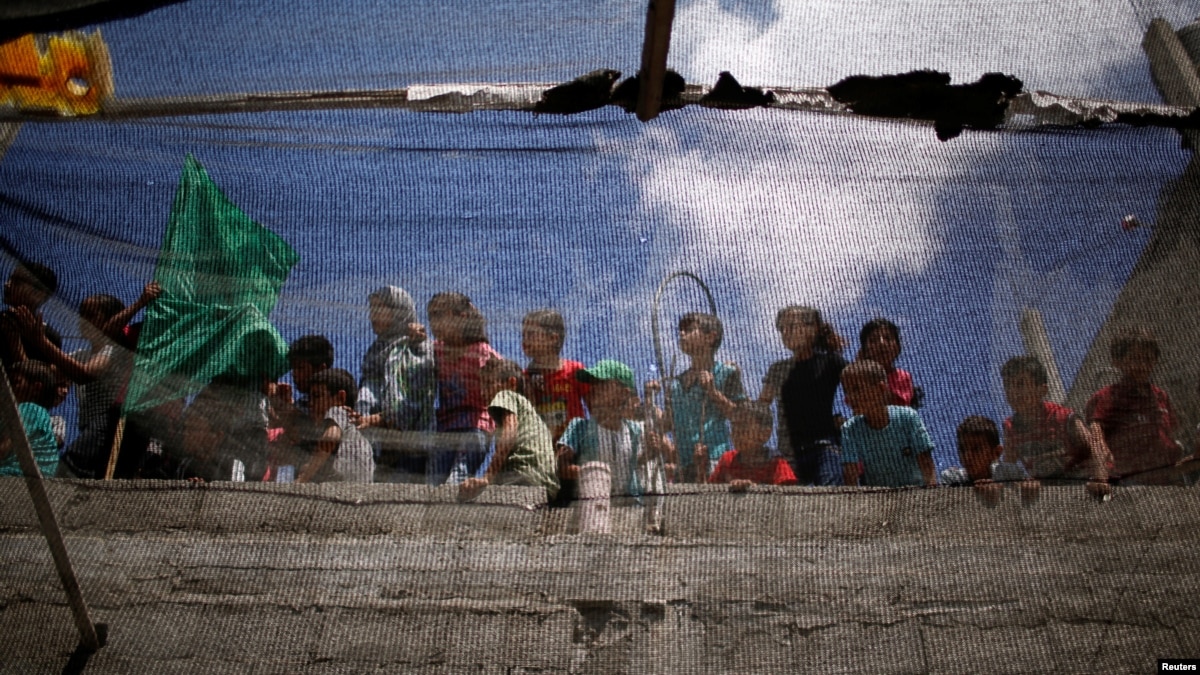
A Palestinian teenager died Saturday of wounds suffered in border protests in Gaza, according to Gaza medical authorities.
Muamen Fathi al-Hams was the third fatality of Friday's border protests. The two killed Friday were Razi Abu Mustafa, 43, and Majdi al-Satri, 12.
Earlier Saturday, the U.N. Middle East enjoy, Nickolay Mladenov, posted on Twitter:
On Friday, Israeli police closed Jerusalem's al-Aqsa mosque for several hours after a number of people barricaded themselves inside.
Police said the closure came after they were attacked with fireworks and stones following Friday's afternoon prayers. Witnesses said the police stormed the building with tear gas and stun grenades.
Authorities reported the arrest of two dozen people who had taken part in the confrontation.
In a statement, a police spokesperson said, "The police intend to act with a strong and uncompromising hand against the suspects who were arrested and others involved."
Al-Aqsa is Islam's third-holiest site. It sits on Jerusalem's Temple Mount, which is considered the most holy site in Judaism.
Police closed the mosque Friday and then searched all those inside as they left. Some of the men in the temple were detained.
Also Friday, Gaza health officials said a Palestinian was shot and killed at the border with Israel. Authorities identified the man as Ghazi Abu Mustafa and said the shooting took place during Friday protests at the border.
The Israeli military has not commented.
Meanwhile, Israel's defense minister Avigdor Lieberman has announced plans to build 400 settlement homes in the West Bank, in response to news that a Palestinian teen had sneaked into an Israeli settlement Thursday and had stabbed three people, one fatally.
One of the victims, identified by the Israeli army as Yotam Ovadia, 31, later died at a hospital. One other was seriously wounded and the third was slightly injured.
The Israeli army said the incident took place in the Adam settlement, between Jerusalem and the Palestinian town of Ramallah in the West Bank.
Violence between Israelis and Palestinians flared in March when Palestinians began daily protests along the Israeli-Gaza border. At least 140 Palestinians and one Israeli soldier have died. Militants in Hamas-ruled Gaza have fired rockets into Israel, prompting a harsh Israeli response.
Egypt Court Sentences 75 to Death in 2013 Sit-in Case
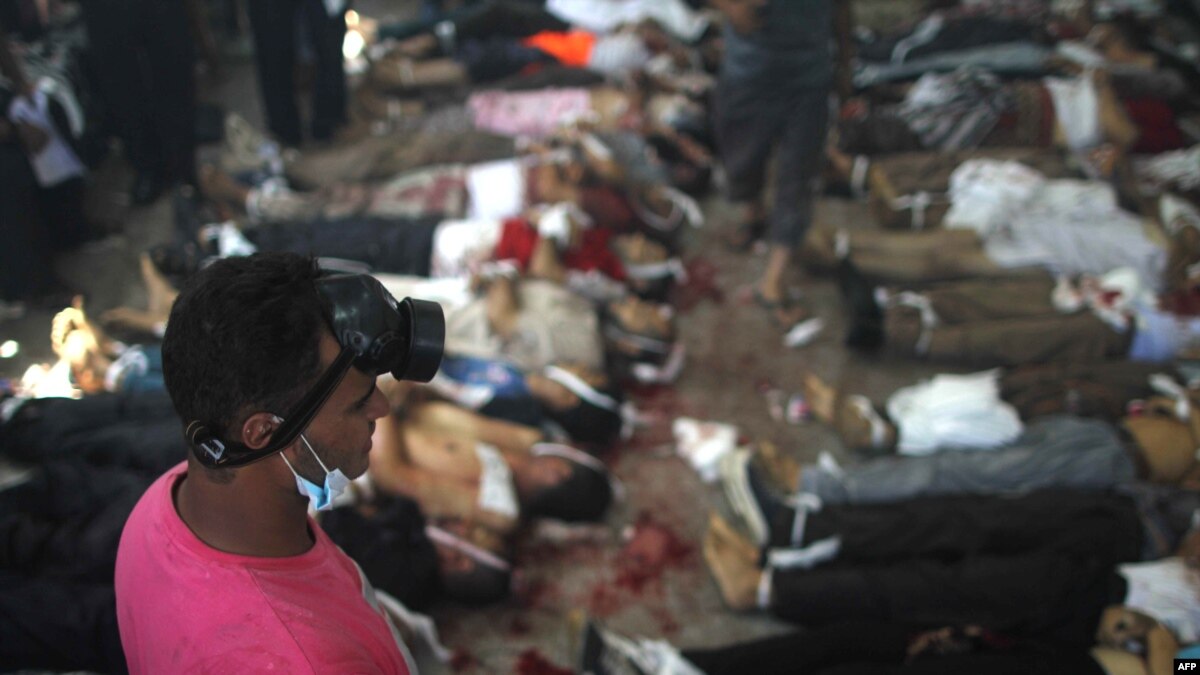
Egypt’s state-run media says a court has sentenced 75 people to death, including top figures of the outlawed Muslim Brotherhood group, for their involvement in a 2013 sit-in.
Saturday’s decision in Cairo Criminal Court will now be referred to the Grand Mufti — the country’s top theological authority — for his non-binding opinion on the sentences. He usually approves the court’s decision.
Sentencing for more than 660 others was set for Sept. 8, according to state-run Al-Ahram news website.
The case involves 739 defendants, including the Muslim Brotherhood’s Supreme Guide Mohammed Badie and photojournalist Mahmoud Abu Zeid. Charges range from murder to damaging public property.
The 2013 sit-in supported former Islamist President Mohammed Morsi who was militarily ousted following mass protests against his divisive one-year rule. Morsi hailed from the Brotherhood. The sit-in was violently dispersed.
Kurdish-backed SDC to Work With Syria to End War
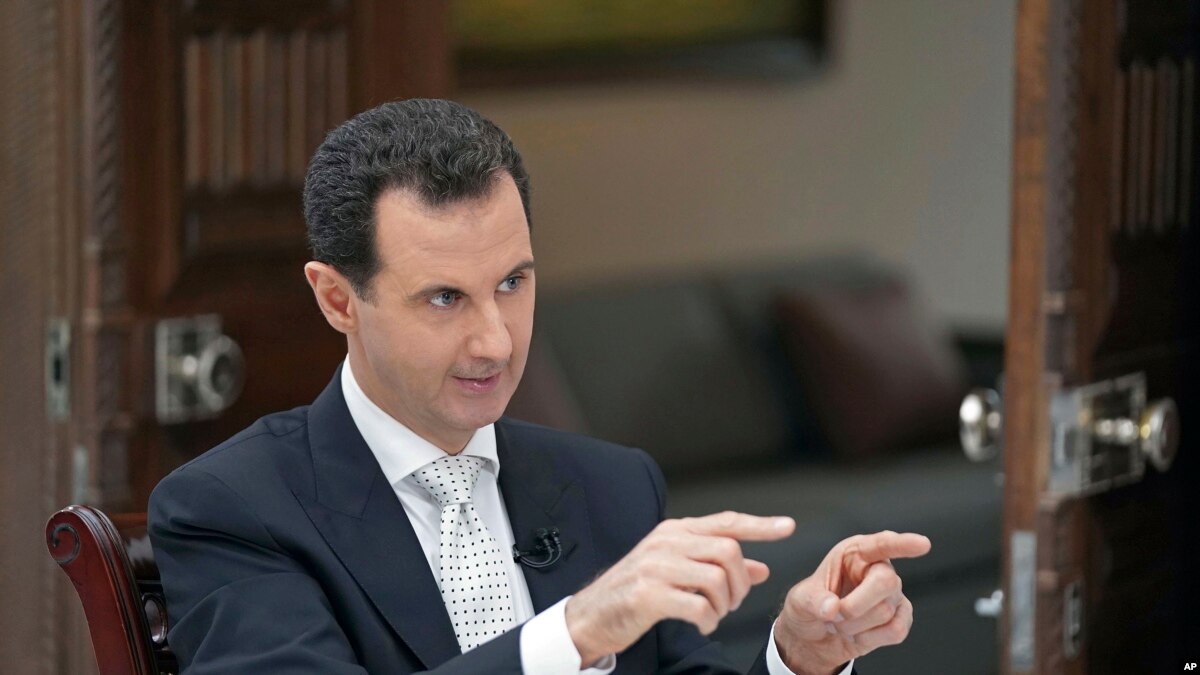
The Kurdish-backed Syrian Democratic Council (SDC) says after meeting with Syrian government officials that it will work with the government to end seven years of violence in the country.
The SDC said Saturday that both sides, after meeting in Damascus, had agreed to work together to plot a "roadmap leading to a democratic and decentralized Syria."
This was the SDC's first declared visit to Syria's capital, indicating the interest of Kurdish authorities to open channels of communication with President Bashar al-Assad as the SDC seeks a political accord to preserve their region's autonomy within Syria.
The Kurdish authorities, which control about one-quarter of Syria, have avoided conflict with Assad during the seven-year-long war, and at times have fought common foes, including rebels, which government forces gradually are crushing with help from Russia and Iran.
Friday, July 27, 2018
Lunar Eclipse, Blood Moon Delight Skywatchers in Cairo
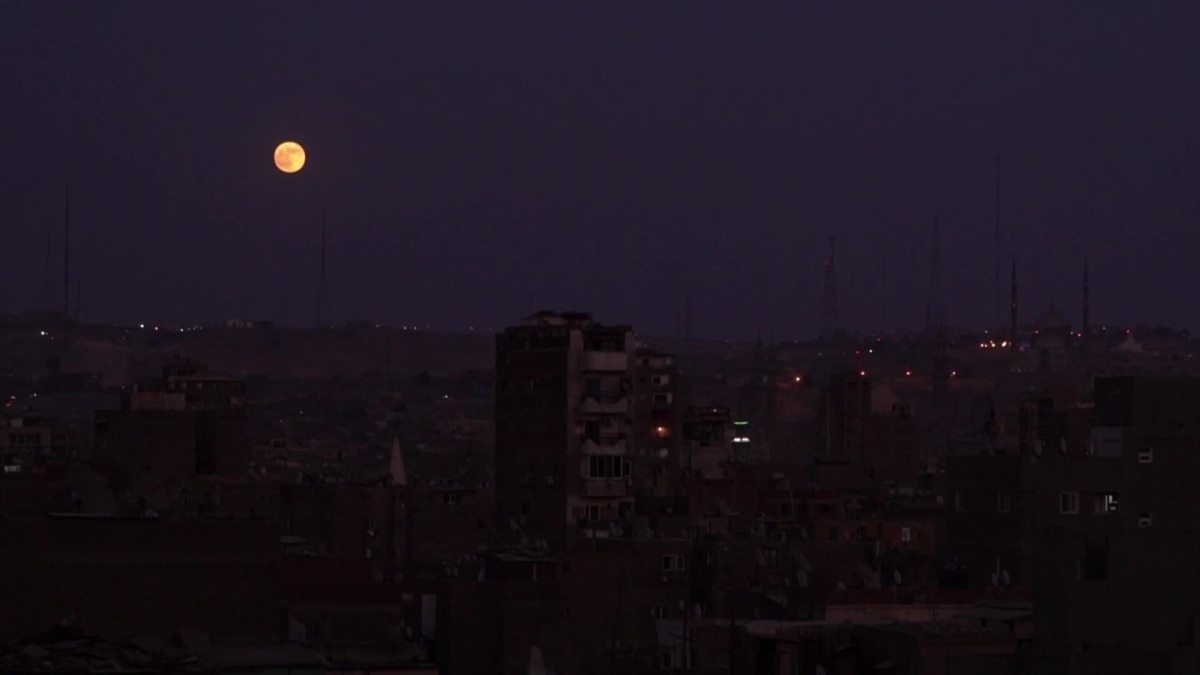
Astronomers and local residents gathered to gaze in awe at the longest lunar eclipse of the 21st century: 1 hour, 43 minutes. During eclipses, the moon turns a red or brownish color because the light that reaches it passes through the earth's atmosphere. In Cairo, astronomers with their telescopes volunteered to wow stargazers
Read More Lunar Eclipse, Blood Moon Delight Skywatchers in Cairo : https://ift.tt/2K2ztguRights Groups: Iran Confirms Prison Terms for 8 Baha'is
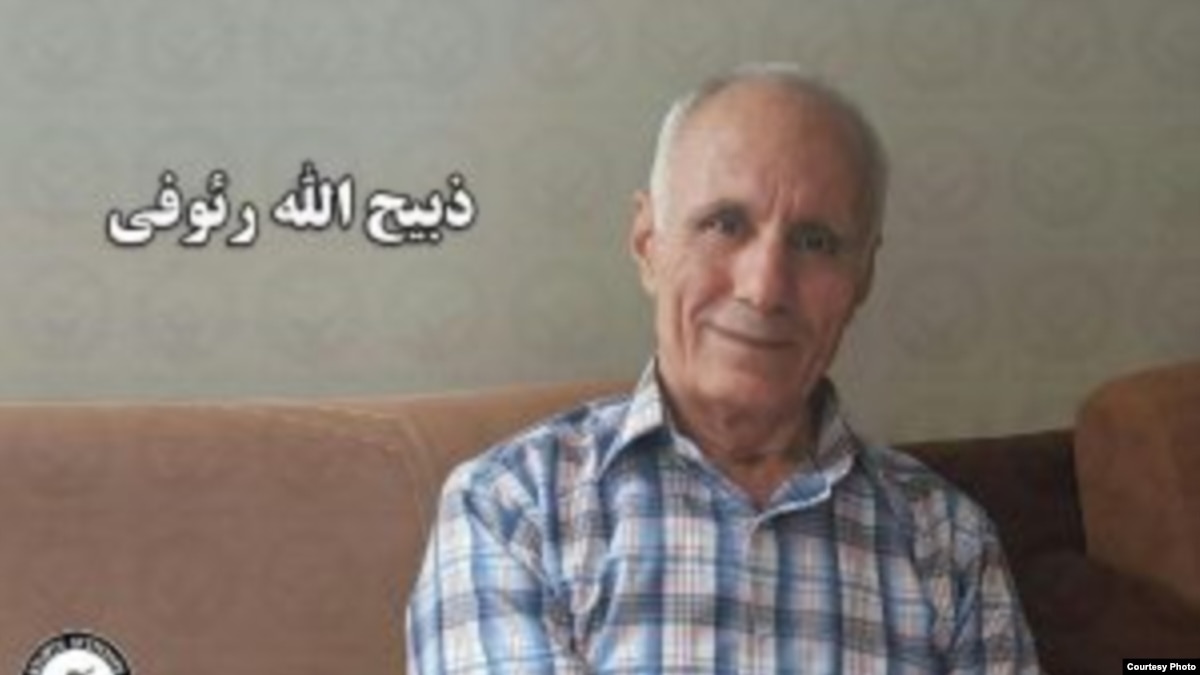
Human rights groups say Iranian courts have confirmed prison terms for eight Baha'is, members of a religious minority that has experienced decades of discrimination in the Shiite Muslim-majority nation.
In a report published Thursday, Iran's Human Rights Activist News Agency (HRANA) said an appeals court in the central city of Yazd confirmed prison terms for six Baha'i men and one Baha'i woman. The report did not specify the charges against the seven or when the court confirmed their sentences.
Iran considers its Baha'is to be heretics with no religion. Rights groups say authorities routinely arrest members of Iran's estimated 300,000-strong Baha'i minority for expressing or practicing their beliefs.
HRANA said two of the men sentenced by the Yazd court, Mehran Islami Amir Abadi and Mehranband Amir Abadi, were given prison terms of 1½ years. It did not say whether they were related.
The rights group said Mehran Islami Amir Abadi already was facing one year of prison time in connection with another case, his 2012 arrest on charges of spreading anti-government propaganda. It said he probably would have to serve the previous sentence and the new sentence consecutively, keeping him in prison for 2½ years.
The rights group named five other Baha'is as receiving three-year prison terms from the Yazd court.
In an earlier report published Wednesday, HRANA said an appeals court in the northwestern city of Sanandaj confirmed a one-year prison sentence for a local Baha'i man, Zabihollah Raoufi, 69. It said Raoufi also was sentenced to one year in exile in the southern city of Minab, but it did not say when the court rulings were made.
Arrested in 2015
HRANA said Iranian authorities arrested Raoufi in 2015 and released him on bail six days later, with a court later convicting him of spreading anti-government propaganda.
The New York-based Center for Human Rights in Iran (CHRI) published a report about Raoufi on Thursday, quoting a source who confirmed HRANA's details of Raoufi's sentencing. CHRI added that Raoufi's conviction for spreading anti-government propaganda related to his alleged activities in promoting the Baha'i faith.
HRANA said Raoufi previously was arrested in 2009 on similar charges and served six months in prison in the western city of Tuyserkan.
There was no immediate comment on the latest sentencings of Iranian Baha'is from the Baha'i International Community. BIC leaders have called for international pressure on Iran to stop mistreatment of Baha'is and to abide by its international commitments to respect their religious beliefs.
This report was produced in collaboration with VOA's Persian service.
Media Rights Group Condemns Israel for Arrest of Palestinian Writer
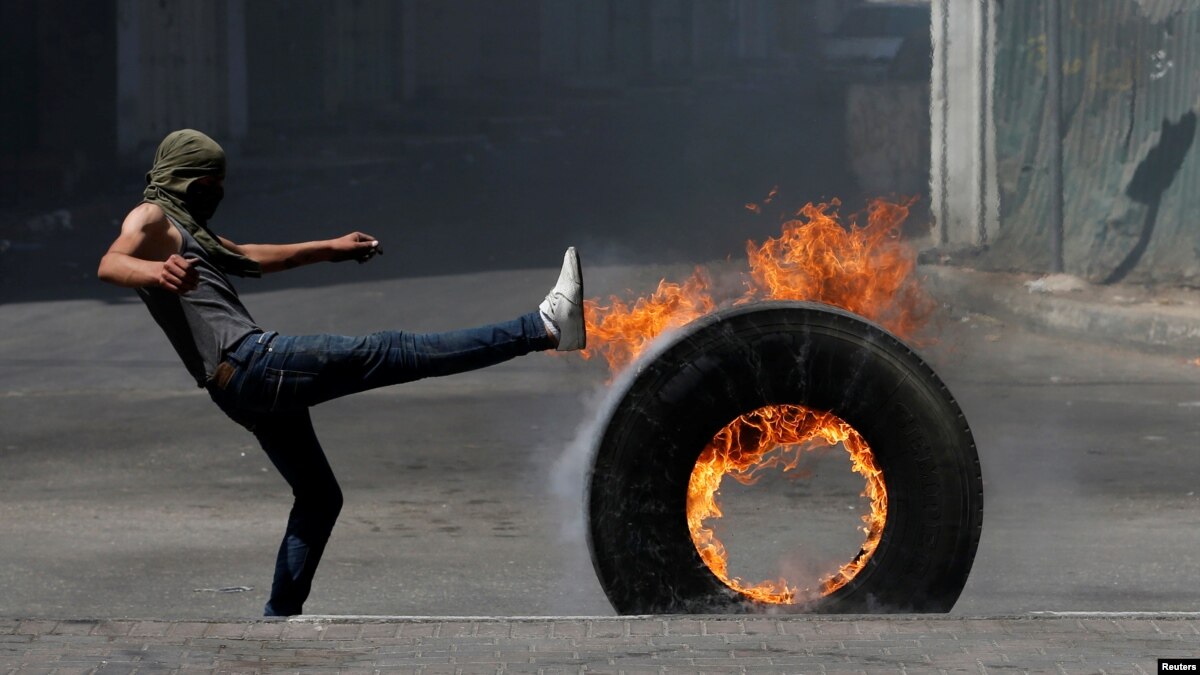
A media rights group is expressing concern after Israeli security forces arrested a prominent Palestinian writer in the West Bank.
The Committee to Protect Journalists (CPJ) said Friday that Israel should immediately explain why they have Lama Khater in custody or let her go.
Israeli officials arrested Khater, 32, Tuesday for alleged involvement in Hamas terror activities.
CPJ said Khater, a prominent blogger, is also a contributing opinion writer to several media outlets, including Qatar-based Al-Jazeera, the Hamas-affiliated Quds News Network and the Arab online women’s publication Meem Magazine.
CPJ said Israeli authorities raided Khater’s house in the southern West Bank city of Hebron on Tuesday and arrested her without informing her of any charges against her.
“We are concerned about the arrest of Lama Khater given Israel’s frequent use of legal measures, including administrative detention, to keep journalists in jail without bringing any charges against them,” said CPJ’s Middle East and North Africa program coordinator, Sherif Mansour.
Khater, who has nearly 90,000 followers on Twitter, recently wrote tweets criticizing Israel for denying Muslims entry to the Temple Mount complex in Jerusalem.
Mattis: Training for Joint Patrols with Turkey in Syria to Start Soon
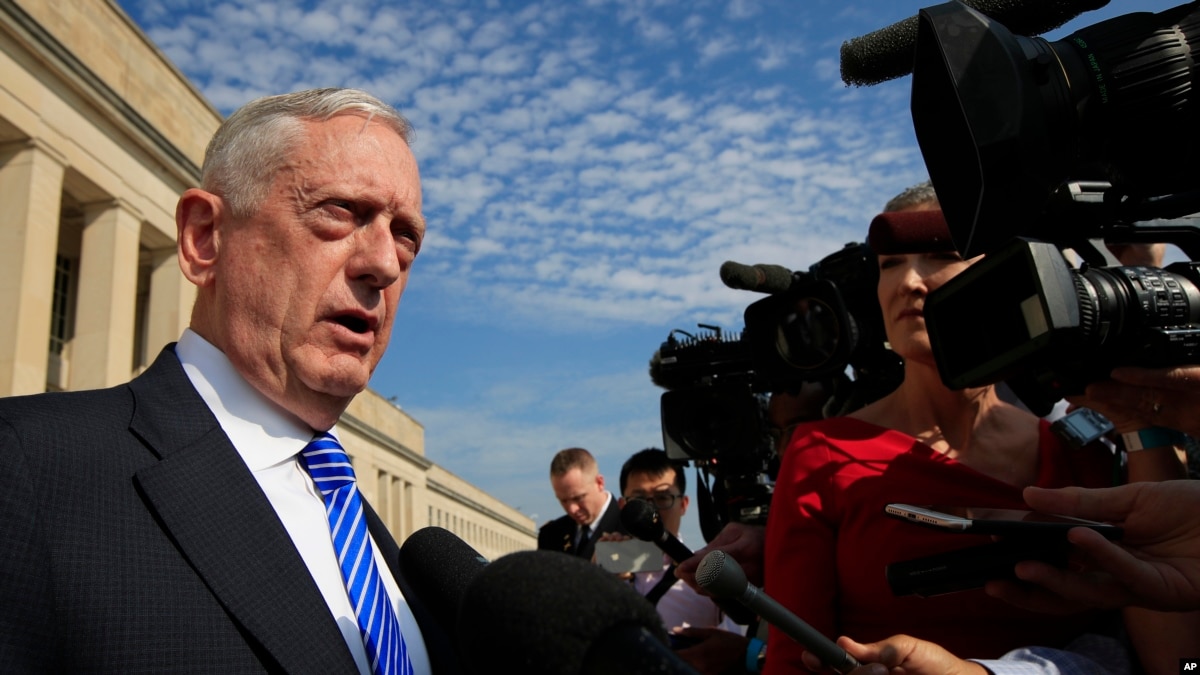
U.S. Defense Secretary Jim Mattis says equipment has landed at a base in Turkey to prepare Turkish troops for joint patrols with U.S. forces in northern Syria.
"Training equipment has landed in Incirlik," Mattis told reporters Friday at the Pentagon, referring to a strategic air base in southern Turkey used by American forces.
Mattis said the training should start within weeks.
"I don’t think we’re talking months," he said.
It is unclear when U.S. and Turkish forces would start conducting the joint patrols in Syria once training of Turkey's troops is complete.
Last month, the United States began "coordinated but independent patrols" with Turkey near the volatile northern Syrian city of Manbij.
The city houses Kurdish militia fighters. Washington supports the Kurdish fighters there, while Ankara says they are anti-Turkey terrorists.
The Pentagon says the purpose of the patrols are to support "long-term security in Manbij" and uphold its commitments to NATO-ally Turkey.
Lebanon's Druze Leader Attacks Syrian Government Over Massacre
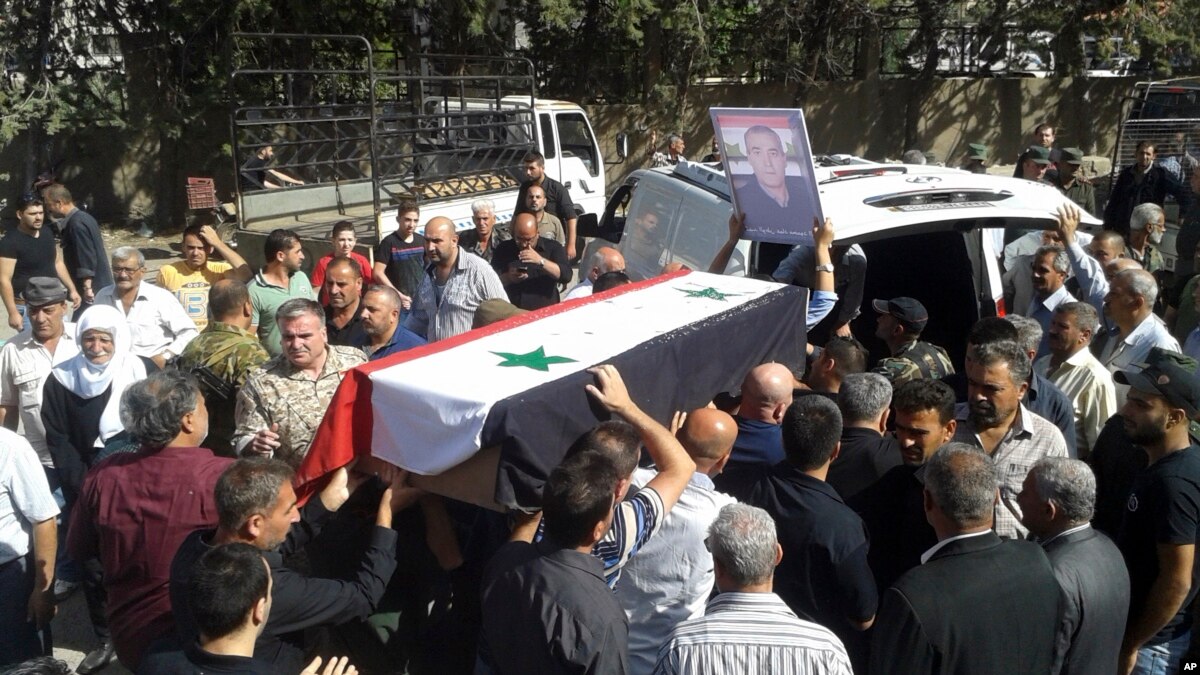
The main leader of the Druze sect in Lebanon on Friday attacked the Syrian government for failing to stop an Islamic State massacre of Druze in Syria, saying it should have noticed the militants gathering to attack.
"No one can tell me that the squadrons of many American, Russian and foreign planes did not see this gathering which suddenly took the regime by surprise and raided Jebel al-Arab," said Walid Jumblatt.
Islamic State's assault on the city of Sweida and nearby villages in the Jebel al-Arab area on Thursday killed more than 200 people, many of them civilians.
Syrian state media said the army had intervened and battled the militants with both ground forces and airstrikes.
Jumblatt, who heads the largest Druze political party in Lebanon, is a strong critic of Syrian President Bashar al-Assad.
Other Druze parties are pro-Damascus.
He also accused Assad of wanting to send Druze from the Jebel al-Arab area, including Sweida, to fight in a future offensive against rebels in Idlib province in northern Syria.
Many community leaders and top Druze religious leaders have refused to sanction enlistment in the army during Syria's seven-year conflict.
"They want to sacrifice the youths of Jebel al-Arab in Idlib," Jumblatt said.
He asked Assad's main ally, Russia, to help prevent that: "We want its [Russia's] guarantee to the people of the Jebel that they will remain in the Jebel and not be used by Bashar as fodder, living or dead, for his personal ends."
Iraq Cleric Sistani Urges government Action on Corruption as Protests Continue
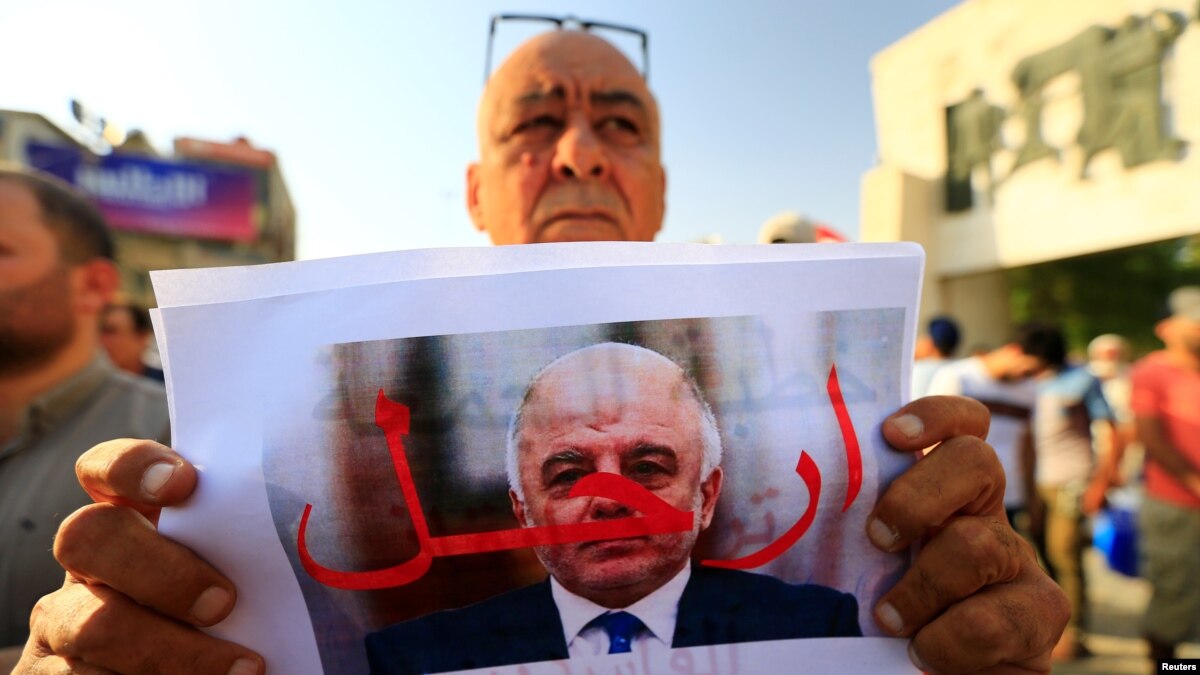
Iraq's top Shi'ite cleric Grand Ayatollah Ali al-Sistani called for a government to be formed as soon as possible to tackle corruption and poor services as further protests took place in the south of the country on Friday.
In a sermon delivered by a representative, Sistani — who is revered by millions of Shiites in Iraq and elsewhere — told the incumbent caretaker administration of Prime Minister Haider al-Abadi to respond to protesters' complaints.
"The current government must work hard, urgently, to implement citizens' demands to reduce their suffering and misery," Sistani's representative said in the Shi'ite holy city of Kerbala.
Shortly after the speech, thousands of people protested in cities in the long-neglected south, Iraq's Shi'ite heartland, against the lack of proper government services and jobs. In Basra, the main southern oil hub city at the edge of the Gulf, about 2,000 people gathered outside the headquarters of
the provincial governorate.
"We need to launch a new war. But this time it should be against corrupted government and not terrorism," said unemployed Wathiq Abdul Ameer, 32.
Protests were also held in the southern cities of Amara and Nasiriya.
Demonstrations over the same issues have occurred in the past but the recent unrest has been more widespread.
Struggle to form government
Anger is mounting at a time when politicians are struggling to form a government after the May 12 election, which was marred by allegations of fraud, prompting a recount.
Abadi, who is seeking a second term in office, is heading a fragile caretaker government, in place until a new administration is formed.
A political bloc led by cleric Moqtada al-Sadr won a majority in the poll on an anti-corruption platform which had wide appeal among voters.
Sistani's representative said the next prime minister "must launch a relentless war against the corrupted and those who protect them."
Abadi said he supported Sistani's remarks and guidance, according to a statement from his office.
Sistani, who rarely intervenes in politics but has wide influence over public opinion, proposed a roadmap with guidelines which the next government should follow to ease economic hardship and fight corruption.
He said the new government should not include officials accused of corruption and the misuse of power, or officials who promote sectarian separation.
Baghdad-based political analyst Ahmed Younis said Sistani had sent a clear message that Abadi's government had failed to put an end to corruption or provide basic services.
"Sistani made it clear Abadi's government has failed to do the job and the new government must fix the unresolved issues. This is a really tough obstacle ... for Abadi."
Tens of Thousands Displaced in Southern Syria in Urgent Need of Aid
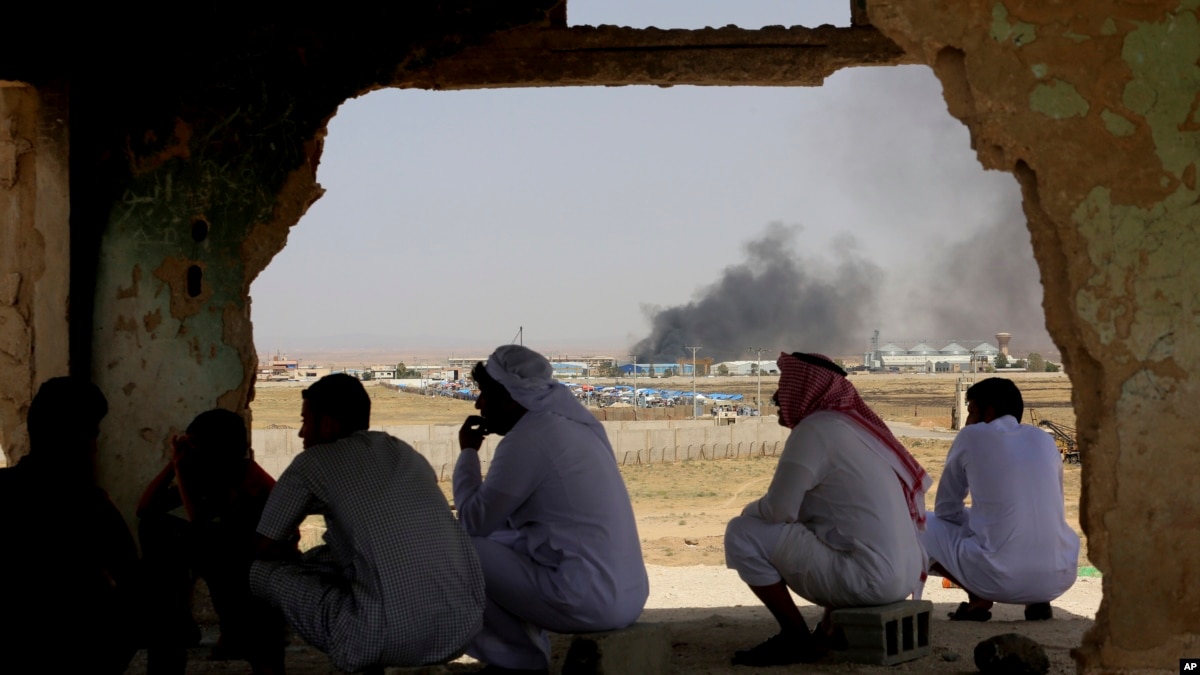
The United Nations says nearly 200,000 people displaced by five weeks of fighting in southern Syria are in need of humanitarian assistance, but access to them is severely limited.
An assault by Syrian government forces and their Russian allies has succeeded in dislodging rebels from most of the territory they controlled in southwest Syria. Five weeks of airstrikes and barrel bombings have caused more than 182,000 people in the governorates of Dara'a, Quneitra and Sweida to flee their homes.
The U.N. Office for the Coordination of Humanitarian Affairs said people are living in dire circumstances and urgently need life-saving assistance. While concern for their well-being is rising, the situation of some 55,000 civilians trapped in a stretch of land near the Golan area is becoming increasingly alarming.
OCHA spokesman Jens Laerke said the 200-square-kilometer area near the Jordanian border remains under the control of a group affiliated with Islamic State.
"We, of course, are very concerned about this particular group's policy of restricting freedom of movement for civilians who are trying to leave the area and only a very limited number of civilians have been able to escape. … Those who remain behind are subject to heightened hostilities," he said.
For instance between July 21 and 23, Laerke said, airstrikes in the area reportedly killed at least 32 civilians, including women and children.
He said agencies also worry about another group of some 100,000 civilians near Golan Heights who face hostilities and have no access to aid. He said the U.N. was forced to suspend cross-border humanitarian convoys from Jordan to the area more than one month ago because of the deteriorating situation in Syria.
Warehouses that once were stocked with food and other relief supplies now are nearly empty, he added.
Kurdish-Backed SDC Holds Talks With Syrian Government
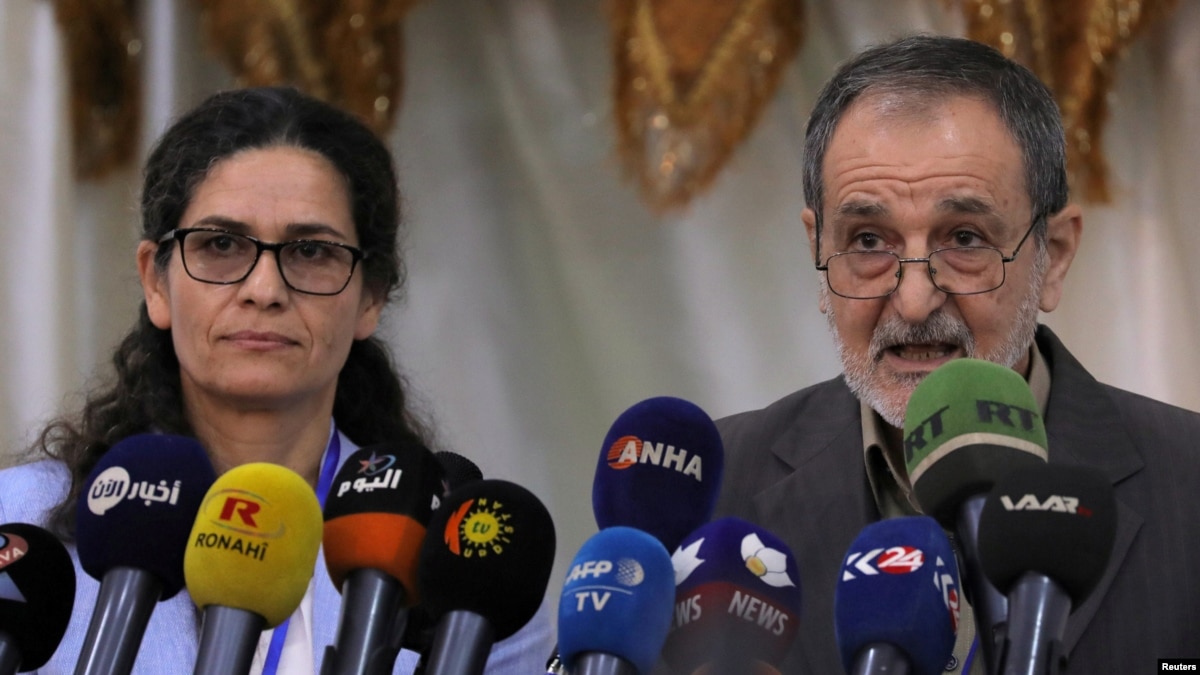
A delegation of the Kurdish-backed Syrian Democratic Council (SDC) and U.S.-backed Syrian Democratic Forced (SDF) is in Syria for talks with Syrian government officials, an alliance official said on Friday.
The delegation arrived in Damascus two days ago, SDC co-chair Riad Darar said, adding that Kurdish authorities are working towards a settlement for northern Syria.
This is the first SDC’s declared visit to Syria’s capital, which indicates the interest of Kurdish authorities to open channels of communication with Syrian President Bashar al-Assad as they seek a political accord to preserves their region’s autonomy within Syria.
The meetings were expected to primarily discuss services in the Kurdish-controlled areas, but Darar said the delegation had no set agenda and the talks might expand to include political and security issues.
The Kurdish authorities, which control about one quarter of Syria, have avoided conflict with Assad during the seven-year-long war and at times have fought common foes, including rebels that government forces are gradually crushing with help from Russia and Iran.
Lebanon Considering Legalization of Cannabis
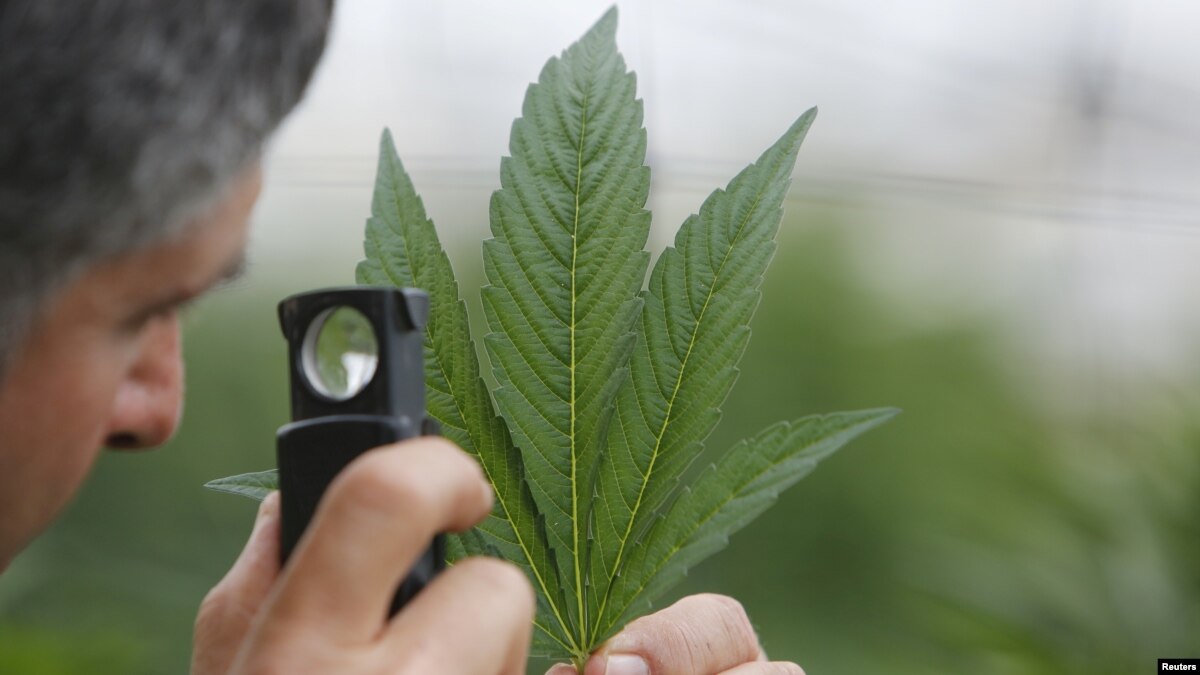
A Lebanese lawmaker has introduced a draft bill in parliament that would legalize the use of cannabis for medical purposes.
Speaking to the Associated Press, Antoine Habchi said he is proposing using the plant as alternative medicine to fight addiction and at the same time as a way to help Lebanon's Bekaa Valley restore its economy and generate much needed income.
Habchi said that under the bill, cultivation would be tightly controlled.
However, it will likely take months of discussions before the draft bill would come to a vote.
Lebanon is the third largest cannabis producer in the world, after Morocco and Afghanistan, according to the United Nations.
Centered on the Bekaa Valley, known for narcotics production, Lebanon produces some of the finest quality cannabis, mostly processed into hashish.
Thursday, July 26, 2018
Palestinian Stabs 3 Inside Israeli Settlement
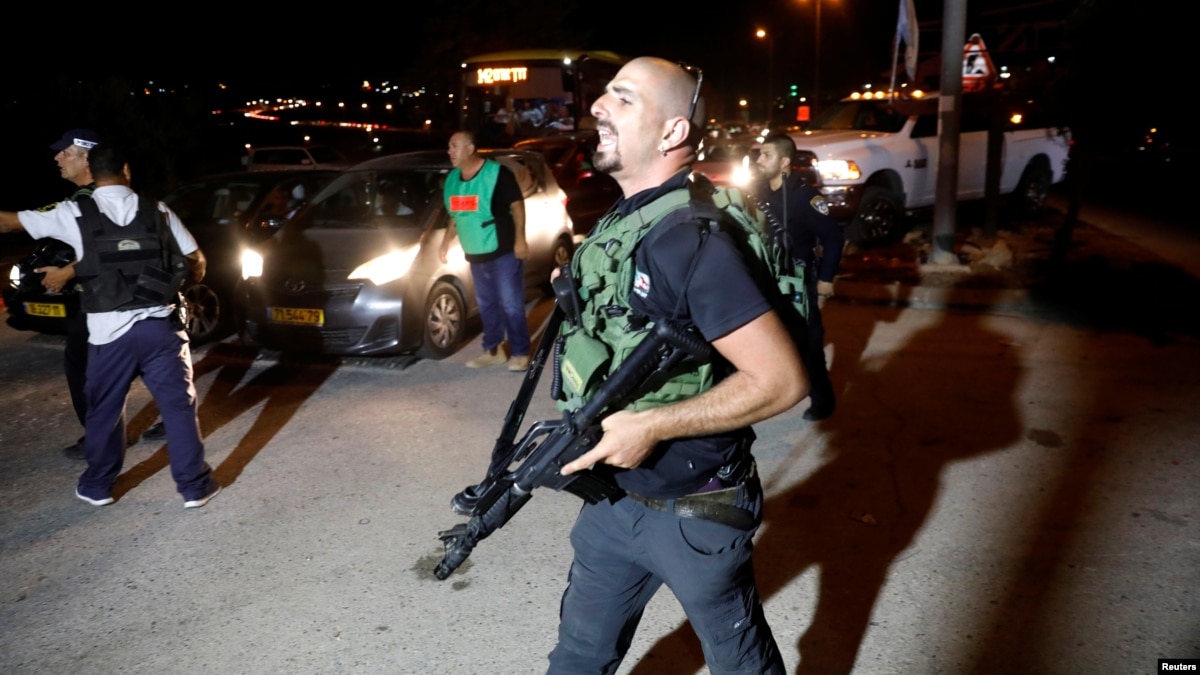
Israeli soldiers shot and killed a Palestinian who sneaked into a Jewish settlement and stabbed three people, Israeli officials said.
Two of the wounded were seriously hurt, and the third was slightly injured.
The Israeli army said the incident took place in the Adam settlement, between Jerusalem and the Palestinian town of Ramallah in the West Bank.
Violence between Israelis and Palestinians has flared up since March, when Palestinians began daily protests along the Israel-Gaza border.
At least 140 Palestinians and one Israeli soldier have died. Militants in Hamas-ruled Gaza have fired rockets into Israel, prompting a harsh Israeli response.
Some Syrian Refugees Oppose Russian Repatriation Push
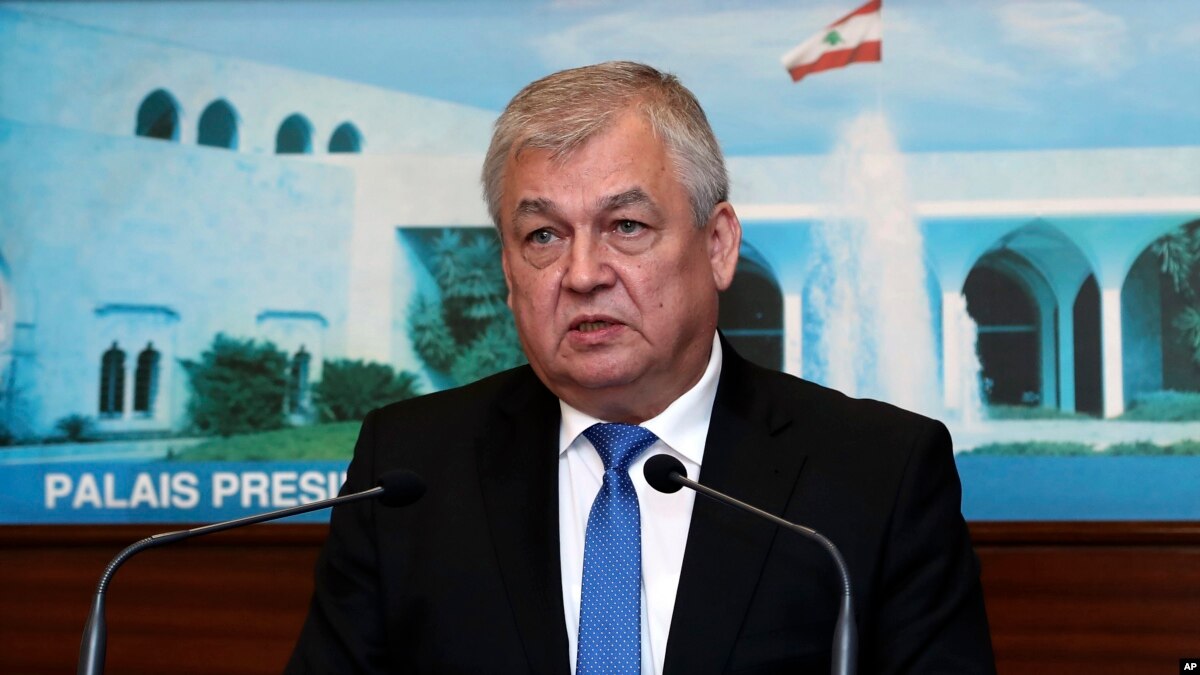
Even as Russia pushes to repatriate Syrians who fled their country amid civil war, many of the refugees in Jordan said Thursday they will not return before the war has ended and their safety is assured.
Some Syrians interviewed in Amman also said they don’t trust Russia as a mediator because it helped President Bashar Assad retake large swaths of territory from fighters who revolted against him.
“As a free, honest Syrian citizen, I consider Russia as a state occupying Syria,” said Abdel-Nasser Abu Naboot, 40, who was at the U.N.’s refugee agency office to update his personal information with dozens of other Syrians. “Russia is not a negotiator ... it bombed us, children and charities.”
His comments echoed that of many Syrians in Jordan and Lebanon concerned about a Russian initiative to return refugees to homes back in Syria without security assurances. The U.N. has also expressed concern about a premature return before the situation in Syria stabilizes and without guarantees for returning refugees.
Russia’s special presidential envoy for Syria, Alexander Lavrentiev, acknowledged the concerns in comments to reporters in the Lebanese capital after meeting officials in Beirut and Amman on Thursday.
“There are a lot of issues dealing with this problem. It’s a lack of confidence, a lack of trust, just a lack of financial assistance. But these questions can be solved,” he said, adding that the Syrian government is willing to guarantee there will be no repression or measures against those who really want to return to civil life.
He said it was a “good sign” that hundreds of refugees in Lebanon were starting to return to Syria, describing it as “just the beginning.”
“You know its just like a snowball which comes from the mountain, with every passing meter it becomes bigger and bigger,” he said, speaking in English.
Many Syrians who fled war and repression are unwilling to return under Assad’s rule without guarantees they won’t be harassed, detained or imprisoned.
To return to his home in southern province of Daraa, Abu Naboot says he wants the goals of the Syrian “revolution,” which began in 2011, to be achieved, including ending “oppression.” He insisted that he “will not go to pre-2011 Syria.”
Eager to show a normalizing situation in Syria, Russia has stepped up efforts to encourage regional host countries, including Jordan, Lebanon and Turkey, to facilitate the return of Syrian refugees. The move is seen as an attempt to assert Russia’s successes in helping Assad retake most of the country from rebels after seven years of unrest.
The Russian initiative was proposed following the summit in Helsinki between U.S. President Donald Trump and Russian President Vladimir Putin, although it was not clear whether the U.S. supported the proposal.
Lavrentiev discussed the repatriation plans in Amman with Jordanian Foreign Minister Ayman Safadi.
“Jordan encourages the voluntarily return of Syrians to their homeland,” Safadi said in a statement after the meeting, stressing the need to provide “security, political, social and economic grounds” to urge the Syrians to go back by themselves.
Lavrentiev later met with the Lebanese president and prime minister in Lebanon, where he said the refugee presence is a burden in many countries and it’s time they returned home. He did not offer concrete proposals on how the repatriation would take place. Lebanon is home to about a million registered refugees and the cash-strapped government says it can no longer afford to host them. The Lebanese foreign minister has accused the U.N. refugee agency of discouraging refugees from returning, an accusation it rejects.
Jordan hosts 667,000 registered Syrian refugees, but the kingdom says the real number, including those undocumented, is almost double. Poor in natural resources and with a faltering economy, Amman says the refugees add an extra burden.
Ibrahim al-Khalaf, 31, a Syrian refugee from the northeast Syria governorate of al-Hasakah, says he doesn’t feel it is safe to return.
“There is nothing clear, no protection program for the Syrians in Syria,” he said as he waited with his wife and three children at the refugee agency’s office to register a newborn. “I don’t want to be separated from my family if I go back because of the military service.”
Mohammad Hawari, a spokesman for the U.N.’s refugee agency, said his organization, while welcoming an end to the Syrian crisis, has a long list of conditions before encouraging refugees to return. UNHCR has insisted it will not allow Syrians to be forcibly returned.
“Before the high commissioner for refugees will facilitate the process of return, there are at least 21 conditions that must be made available, including safety and stability, exemption from conscription, and other things,” he told The Associated Press.
Read More Some Syrian Refugees Oppose Russian Repatriation Push : https://ift.tt/2Af2aXYEgypt President Ratifies Law Protecting Military Officers
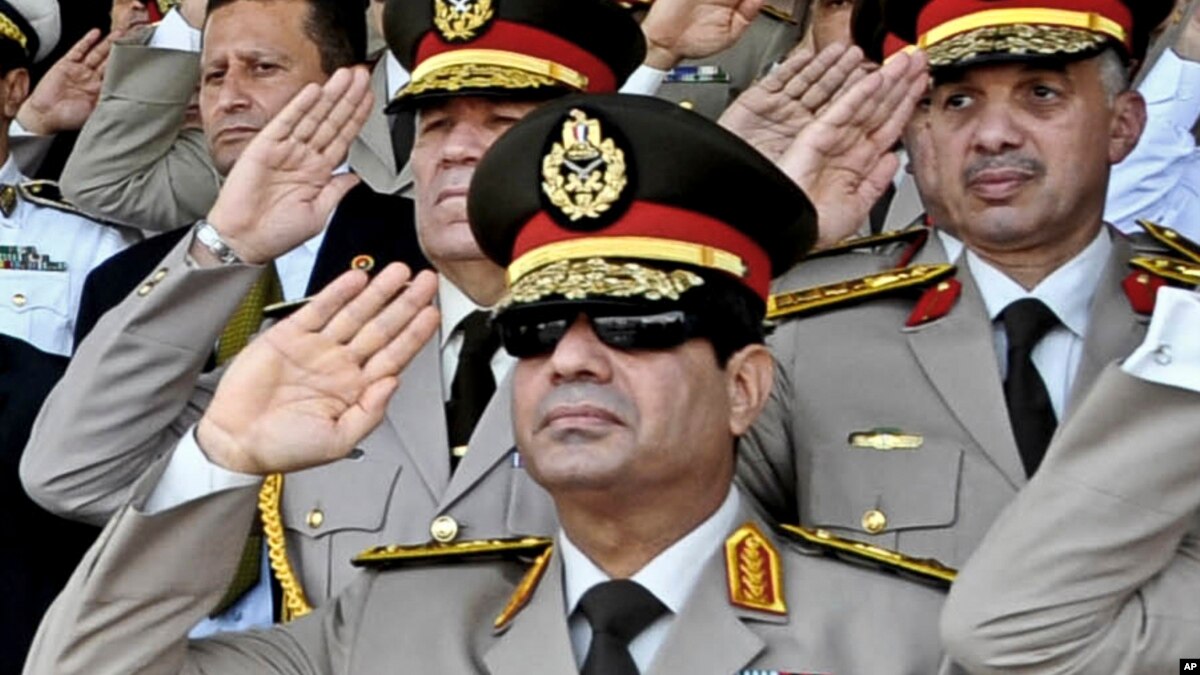
Egypt's President Abdel-Fattah el-Sissi on Thursday ratified a bill that could immunize senior military officers from future prosecution related to violence after the 2013 military overthrow of an elected but divisive Islamist president.
The law, published in the official gazette Thursday, grants senior military officers selected by el-Sissi rewards including immunity from investigation for alleged offenses after the suspension of Egypt's former constitution in July 3, 2013 until parliament assumed its duties on Jan. 10, 2016.
Former president Mohammed Morsi was ousted on July 3, 2013.
Any legal action against the selected officers requires permission from the Supreme Council of the Armed Forces under the new law. They are also privileged with "special immunities" like those granted to diplomats.
General-turned-president el-Sissi led the military's overthrow of Morsi, who hailed from the now-outlawed Muslim Brotherhood group, following mass protests against his rule. Morsi's ouster was followed by a series of violent confrontations between security forces and Morsi's supporters, including one outside a military installation in Cairo in which dozens were killed.
On Aug. 14, 2013, security forces violently dispersed two Cairo encampments supporting Morsi. Hundreds were killed. Rights groups over the years have since denounced the encampments' violent dispersal. Human Rights Watch said the killings "likely amounted to crimes against humanity."
Since Morsi's overthrow, Egypt has launched a severe crackdown on Brotherhood members and supporters, arresting many and trying them on terrorism-related charges. The Brotherhood was later designated a "terrorist organization."
As Temperatures Rise, Egyptians Cope
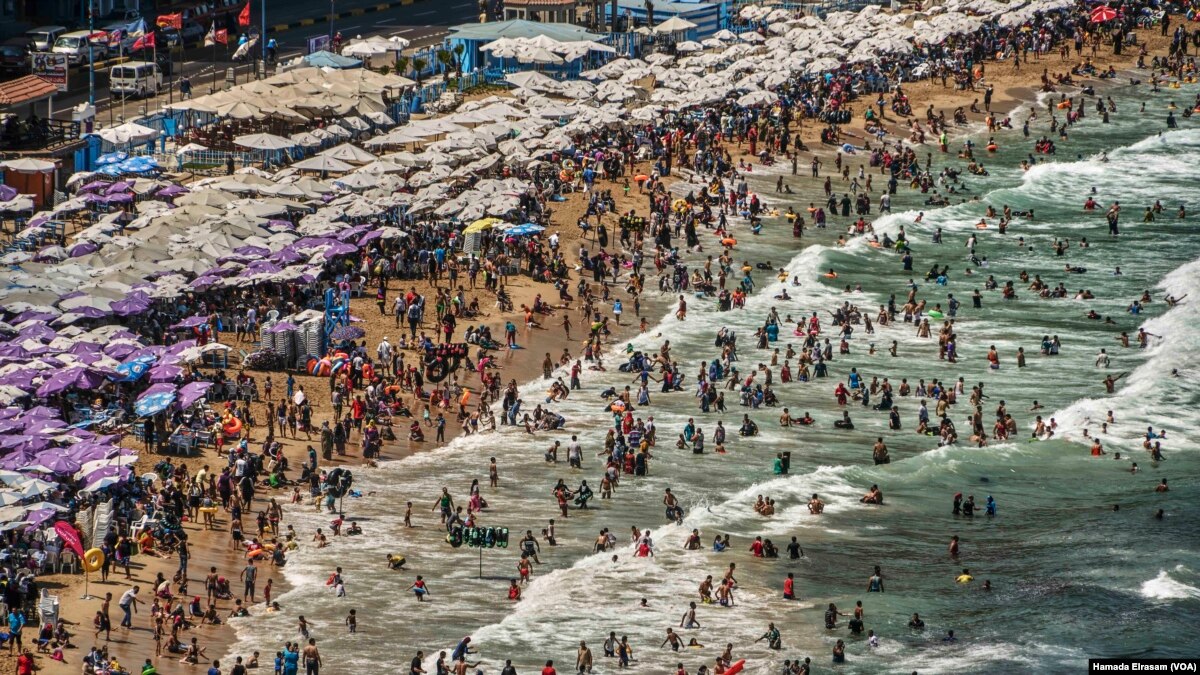
Researchers say Egypt, with its arid, sun-scorched landscape and its limited sources of water, is one of the countries potentially most at risk of suffering dramatic effects of climate change. At no time of year is climate change more on the minds of Egyptians than summer, when many try to escape temperatures that have historically reached as high as 47 degrees Celsius. Photojournalist Hamada Elrasam shows how Egyptians, are coping.
Show more
Wednesday, July 25, 2018
US, France Sanction Entities Tied to Syrian Chemical Weapons
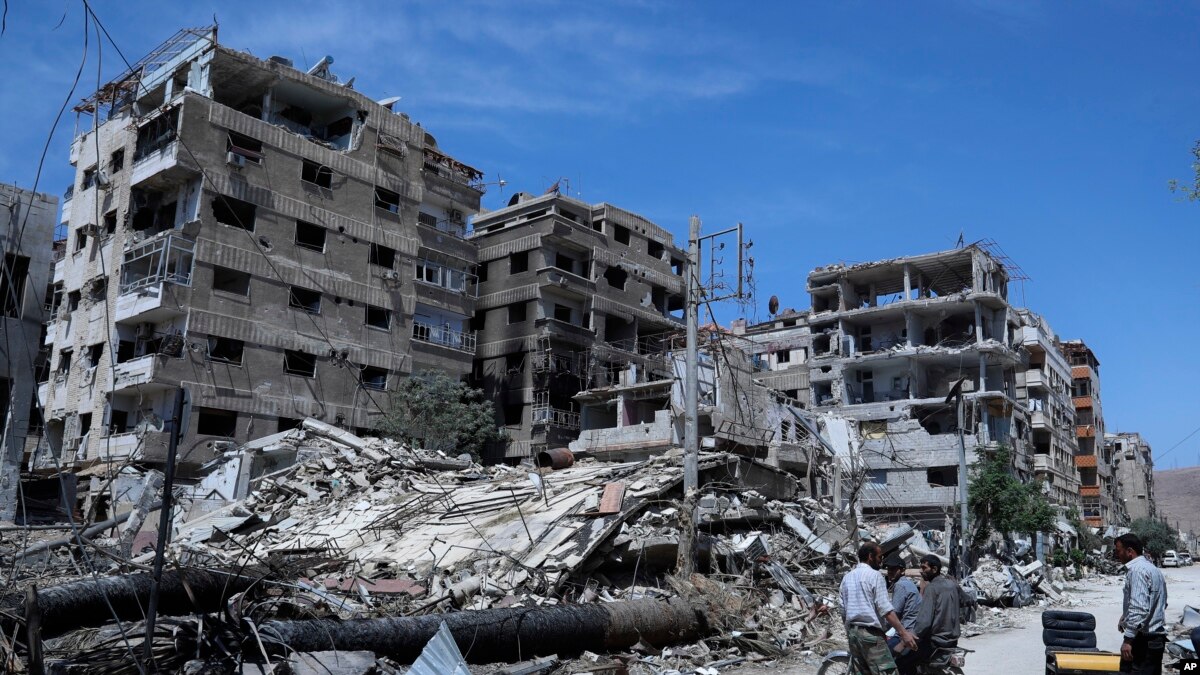
The United States and France have imposed sanctions upon groups and individuals with links to Syria's chemical weapons program, the U.S. Treasury Department said Wednesday.
"Syria's horrific use of chemical weapons, including attacks against innocent women and children, remains deeply embedded in our minds," said Sigal Mandelker, treasury undersecretary for terrorism, said in a statement. "Today, we are continuing our campaign to stop the Assad regime's ruthless attacks by targeting the procurement networks that have supported its chemical weapons program."
According to the statement, the United States will block five entities and eight individuals who have been part of a network supplying electronics to Syria's chemical weapons program.
On Sunday, France froze the assets of 24 individuals in the same network, the statement read.
One entity that Treasury sanctioned is Electronics Katrangi Trading, a Lebanese electronics retailer. Two of the individuals sanctioned by the department were former residents of Massachusetts.
The Syrian government has long received criticism for its alleged use of chemical weapons against its own civilians amid the nation's civil war. The Syrian government and Russia, its ally, have denied these claims.
In April, over 70 people were killed in a suspected chemical attack in the Syrian city of Douma, a rebel-held town. An interim report released in July by the Organization for the Prohibition of Chemical Weapons, an intergovernmental chemical weapons watchdog, found "explosive residues [and] various chlorinated organic chemicals" on the site.
As a response to the April attacks, the U.S., French and British governments launched a missile strike on suspected chemical weapon sites in Syria.
"If the Syrian regime uses this poisonous gas again, the United States is locked and loaded," Nikki Haley, the U.S. ambassador to the United Nations, said in April.
Israel Kills 2 Palestinians in Gaza After Israeli Troops Came Under Fire
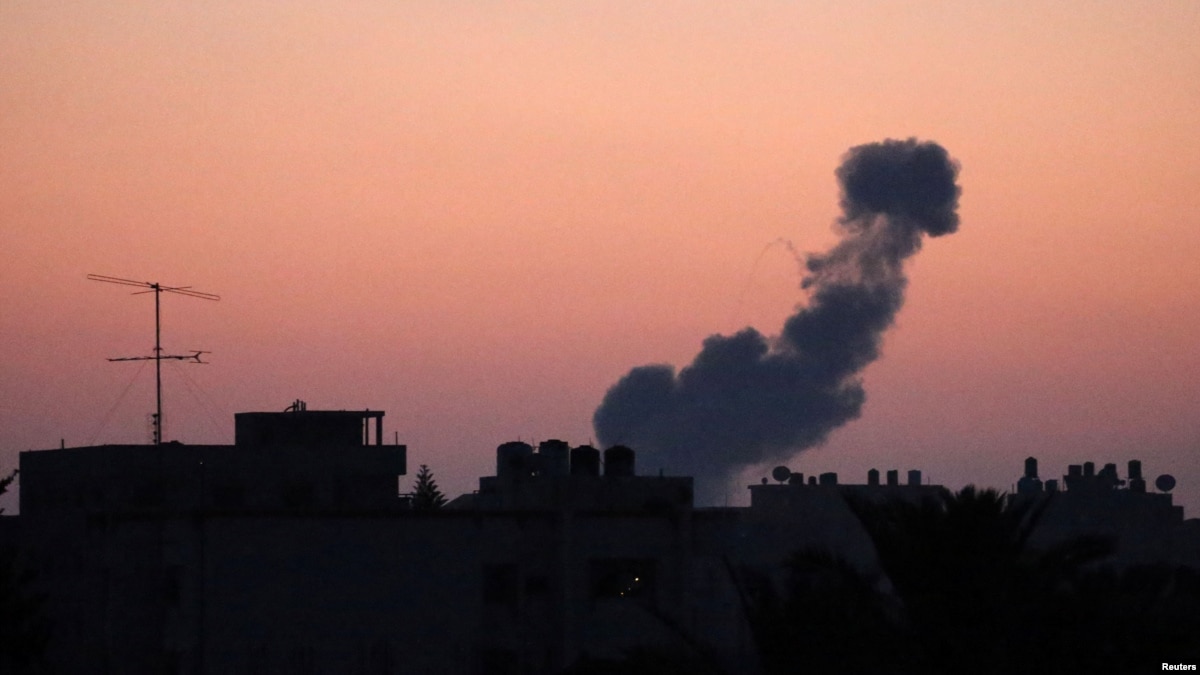
The Gaza Health Ministry said two Palestinians were killed and another seriously wounded Wednesday in Israeli strikes east of Gaza City.
The Israeli military said it was "targeting Hamas military posts in the Gaza Strip" after Israeli troops on the border came under fire.
The latest clash comes only a few days after Gaza's Hamas leaders and Israel agreed to a cease-fire in an attempt to de-escalate hostilities. The cease-fire was broken last weekend when an Israeli soldier was killed by a Palestinian sniper.
Israel retaliated with a massive offensive that raised fears of another war between Israel and Hamas, which have fought three wars since 2008.
US Base in Southern Syria Sends ‘Signal’ to Iran
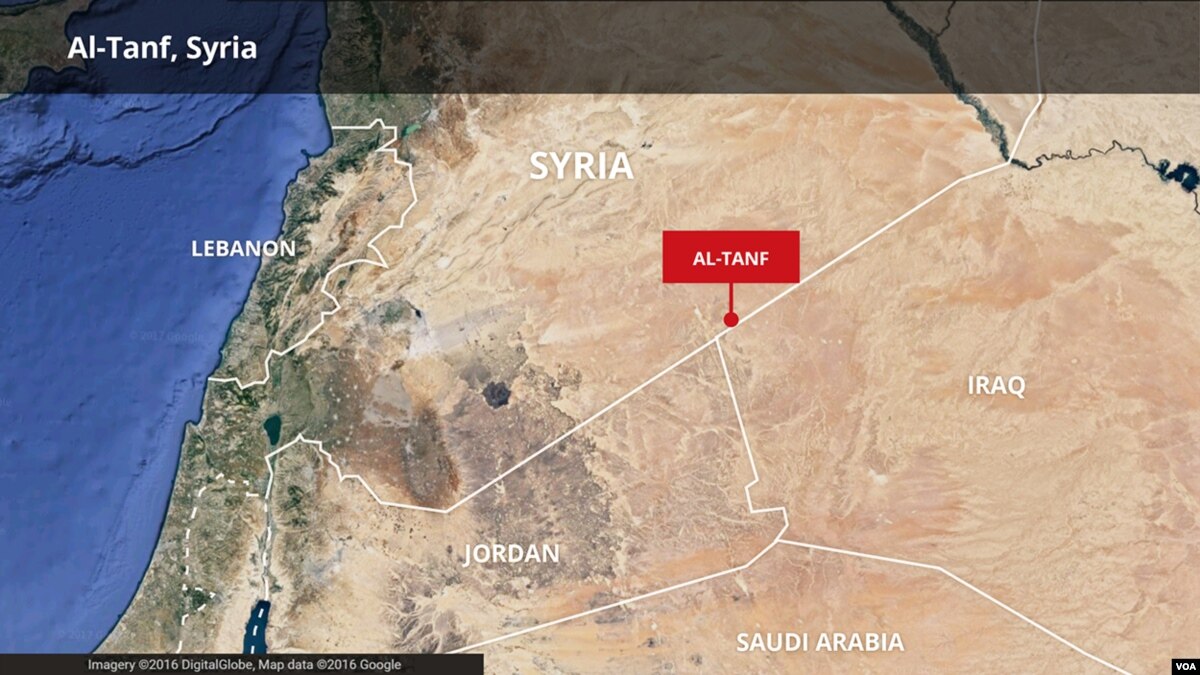
The U.S. base near southern Syria’s al-Tanf border crossing was set up to train local Syrians to fight Islamic State militants, but it also serves as a counterweight to Iranian activities in the war-torn country, U.S. officials and experts tell VOA.
“Our mere presence there accomplishes that, whether it’s a goal or not,” Army Maj. Josh Jacques, a spokesman for U.S. Central Command (CENTCOM), said.
The U.S. military’s primary focus across Syria has been the defeat of Islamic State fighters, and to serve that mission, U.S. soldiers at al-Tanf currently are training a Syrian group called Maghawir al-Thawra (MaT), Jaques said.
While the military is not directly focused on Iran in Syria, it can still indirectly impede Iran’s “destabilizing acts” in the country, according to CENTCOM commander U.S. Army Gen. Joseph Votel.
“There are opportunities for us to indirectly influence their [Iran’s] activities by our presence, by the pursuit of our ongoing operations, that I think disrupt and make it difficult for them to pursue their unilateral objectives,” Votel told reporters during a July 19 briefing.
Land bridge
Jordan, Iraq, and Syria all meet in the area surrounding the U.S. base, a potential space, officials say, through which Iran could create a continuous land bridge that would stretch to the Mediterranean.
But the U.S. has established a so-called “deconfliction zone” in the area that spans about 55 kilometers around the base. The zone is meant to protect the United States and its allies as they battle the Islamic State militant group, and it essentially prevents any non-U.S. ally from entering the area.
“One quiet rationale for maintaining a presence there is to at least monitor and then perhaps deter some of the Iranian forces, or Iranian-backed forces that may have used that part of the country to transit into Syria,” said Brian Katulis with the Center for American Progress.
While the base limits Iranian forces’ ability to move through Syria’s southern border, it is not meant to completely block Iran’s involvement in Syria because much of their engagement comes via airplanes.
The U.S. post does, however, protect American military assets, giving the U.S. the ability to mount drone operations, conduct surveillance, and perhaps even create human intelligence networks.
It also helps to reassure U.S. ally Jordan, whose officials have expressed concerns about how secure its border would be if an Americans weren’t in southern Syria.
“As small as that [U.S.] presence is, I think it sends a signal,” Katulis said.
'Shades of gray'
Michael O'Hanlon, a senior defense fellow at the Brookings Institution, says defeating IS is the “black and white” goal for American forces at al-Tanf, while all the ways that the U.S. indirectly influences Iran in Syria are “shades of gray.”
He says the base also allows the U.S. to “exercise some influence on parts of the country so that Iran isn’t the only important foreign actor.”
“In the short term, you want to create some alternative power centers,” said O’Hanlon.
Once IS is defeated, however, the United States will need a long-term political transition strategy that clearly explains why the military would stay in Syria.
“We’re sort of in a transition phase, where you can still sustain the current effort on the grounds of it being anti-ISIS, but everyone recognizes that the days of that argument carrying the day are numbered,” O’Hanlon said, using an acronym for the Islamic State terror group.
“Just staying for presence sake is not a good enough reason,” he said.
Read More US Base in Southern Syria Sends ‘Signal’ to Iran : https://ift.tt/2Ln0CAqMilitants Kill 38 in Southern Syria Attacks
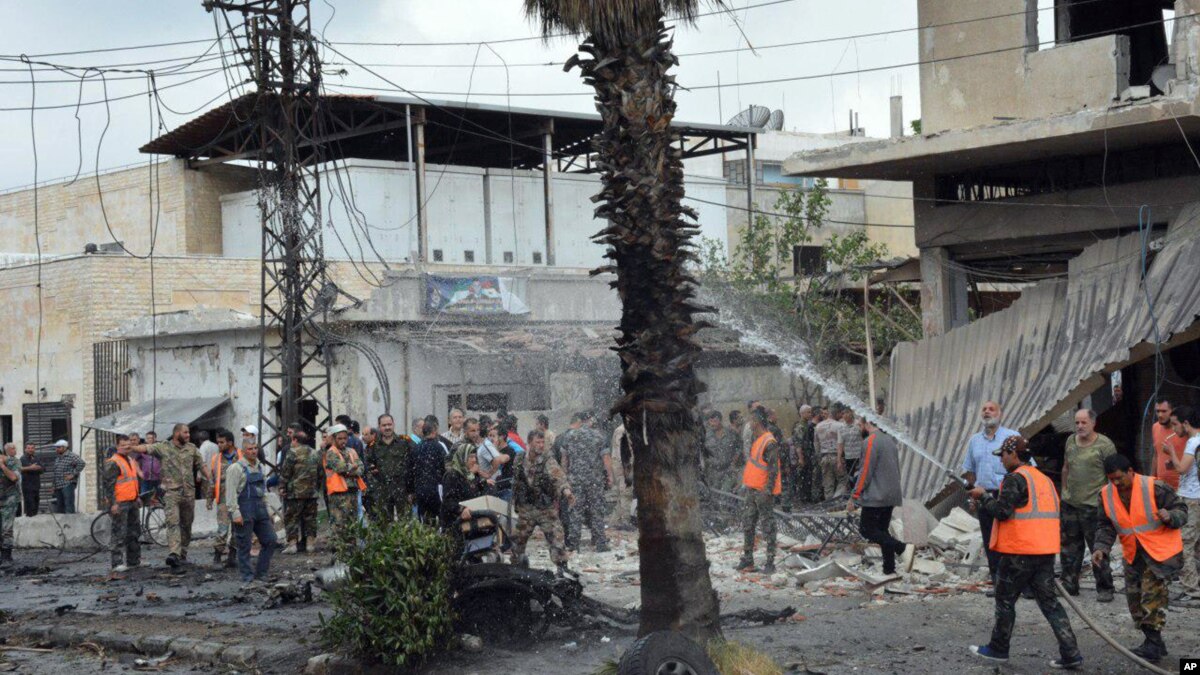
Militants carried out a series of suicide bombings and other attacks Wednesday in southern Syria, killing at least 38 people.
Multiple bombers blew themselves up near a market and a busy square in the city of Sweida.
The Britain-based Syrian Observatory for Human Rights reported clashes in nearby villages between pro-government forces and Islamic State fighters.
The Islamic State group has lost much of the territory it once held in Syria and neighboring Iraq, but does still control parts of eastern and southern Syria.
Syrian forces have retaken territory from the militants in recent weeks, particularly west of Sweida near the Israeli-occupied Golan Heights.
Tuesday, July 24, 2018
Tunisia PM: Changing Government Now Will Hurt Economy
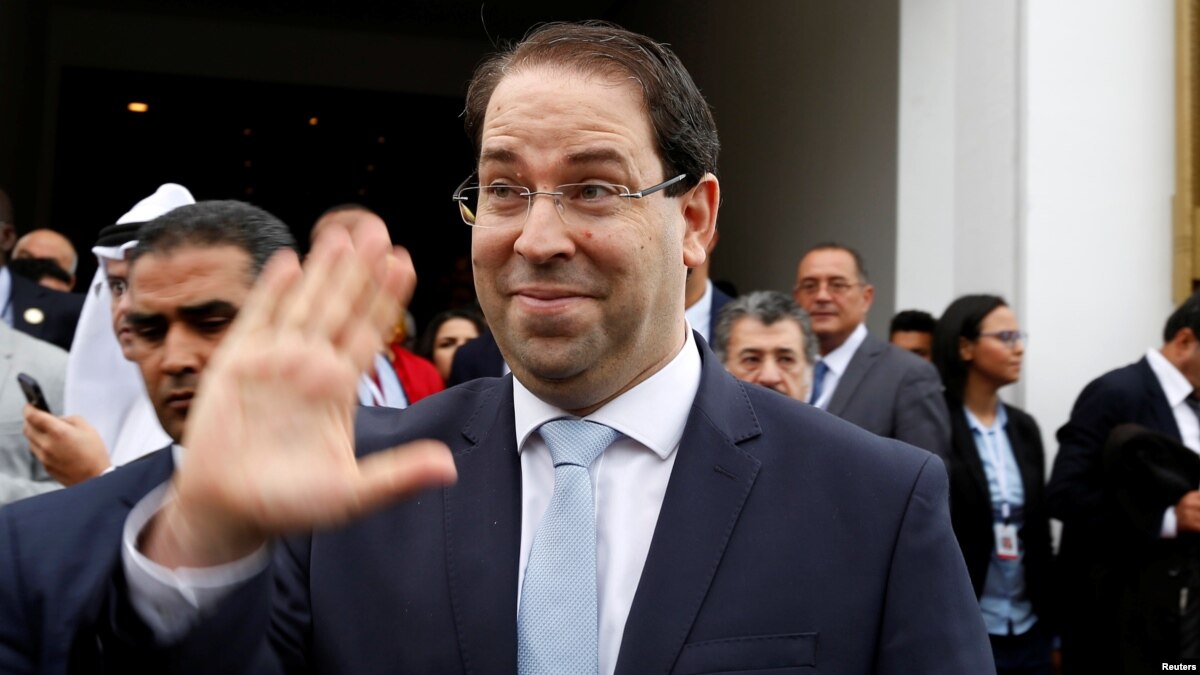
Tunisian Prime Minister Youssef Chahed, rejecting the president's call for him to stand down amid an economic crisis, said Tuesday that a change of government would put the economy at risk and shake the confidence of international lenders.
President Beji Caid Essebsi this month urged Chahed to step down if the country's political and economic problems persisted.
Since the toppling of autocrat Zine al-Abidine Ben Ali in 2011, nine cabinets have failed to resolve high inflation and unemployment. Turmoil and militant attacks have deterred tourists and investors, eroding living standards.
Impatience is rising among lenders such as the International Monetary Fund, which have kept the North African country afloat.
But Chahed said the economy was about to turn a corner.
"A change of government will shake the confidence of Tunisia's international partners ... as economic data will begin to improve by the end of this year," he told state news agency TAP, in his first response to calls to step down.
Chahed has also had to tackle the problem of trafficking of migrants. Human traffickers have increasingly moved their operations to Tunisia since the coast guard in neighboring Libya began a crackdown.
Last month, Chahed fired Interior Minister Lotfi Brahem after dozens of migrants died when their boat bound for Italy sank after setting off from a southern island without being intercepted by security forces.
On Tuesday, Chahed appointed Hichem Fourati, a senior official in the interior ministry, as Brahem's replacement, a government statement said.
In the TAP interview, the prime minister said the government planned to reduce its budget deficit next year to 3.9 percent from 4.9 percent this year, with expectations that public finances would be boosted by improved tourism revenues.
Essebsi's son, Hafedh Caid Essebsi, who is leader of the ruling Nidaa Tounes party, called in May for Chahed's dismissal over his handling of the economy. The call was supported by the powerful UGTT union, which rejected the prime minister's proposed economic reforms.
The moderate Islamist party Ennahda has said the exit of the prime minister would hurt stability at a time when the country needed economic reforms.
Egypt's el-Sissi Opens Power Stations in State Development Drive
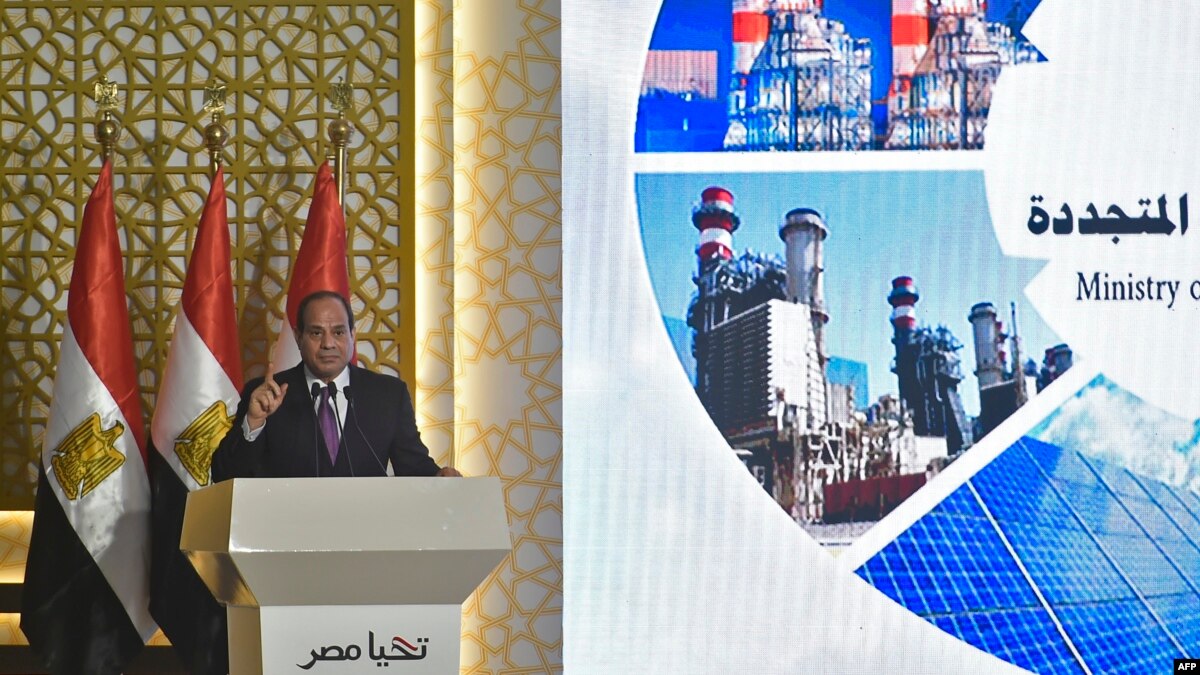
Egyptian President Abdel-Fattah el-Sissi on Tuesday opened three new power stations built for a total of 6 billion euros ($7 billion) as part of the
country's development drive.
Acute power shortages in the years immediately following Egypt's 2011 uprising led to frequent summer blackouts and cuts to industrial output, but the new projects initiated in 2015 are part of an 8 billion-euro deal to supply gas- and wind-power plants to boost electricity generation by 50 percent.
Attending the unveiling of the gas-powered station in the administrative capital, a new city being built as the future government seat east of Cairo, el-Sissi praised Egypt's ability to meet the electricity needs of the country's population of nearly 100 million.
"Today is a day of hope," el-Sissi said. "We have come a long way in one of the most important elements of building and development in the state."
The 4,800-megawatt plant was one of two built in a joint venture between Siemens and Egypt's Orascom Construction, Orascom said in a statement, adding that the second project at Burrulus, in the Nile Delta, had
generation capacity of 9,600 MW.
El-Sissi also unveiled a third gas-powered station in Beni Suef, 110 kilometers (68 miles) south of Cairo. That plant also has capacity of 4,800 MW, sufficient to cover the needs of 15 million people, according to the state-run al-Ahram newspaper.
El-Sissi also opened one of the world's largest wind farms, built at a cost of 12 billion Egyptian pounds ($673 million).
State media said the Gebel el-Zeit station, located in the Red Sea province, has capacity of 580 MW.
Egypt aims to meet 20 percent of its energy needs from renewable sources by 2022 and up to 40 percent by 2035.
Renewable energy currently covers only about 3 percent of Egypt's needs.
Intl. Coalition: Islamic State Controls Just 300 Kilometers in Syria
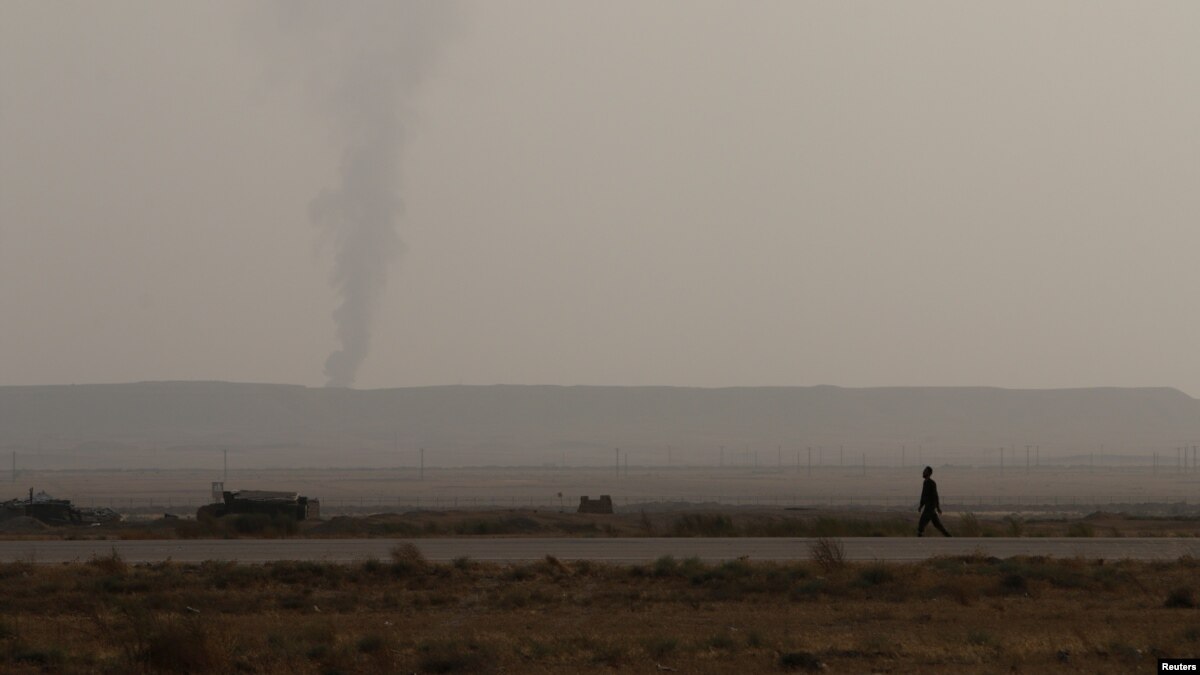
The Islamic State terror group has lost control of all but around 300 square kilometers in Syria, anti-IS coalition officials told reporters Tuesday.
French Brigadier General Frederic Parisot, the director of civil-military operations for Combined Joint Task Force-Operation Inherent Resolve, said the group holds an area of about 30 kilometers x10 kilometers in eastern Deir el-Zour province, stretching from the town of Hajin to al-Bukamal.
Parisot said he did not know the number of Islamic State fighters in the area, but cautioned that the fighting could continue for "at least two or three months."
The French general added that coalition should stay in Iraq and Syria once Islamic State is completely defeated to ensure that the group does not regain the ability to hold terrain.
"I think it's an effort of all the coalition to make sure that after the major combat operations we stay enough to defeat Daesh on a permanent basis," Parisot said, using an Arabic acronym for Islamic State.
At its height, the terror group controlled nearly a third of Iraq and large areas of northern Syria.
Official: IS-Linked Group Kills 2 Policemen in Eastern Libya
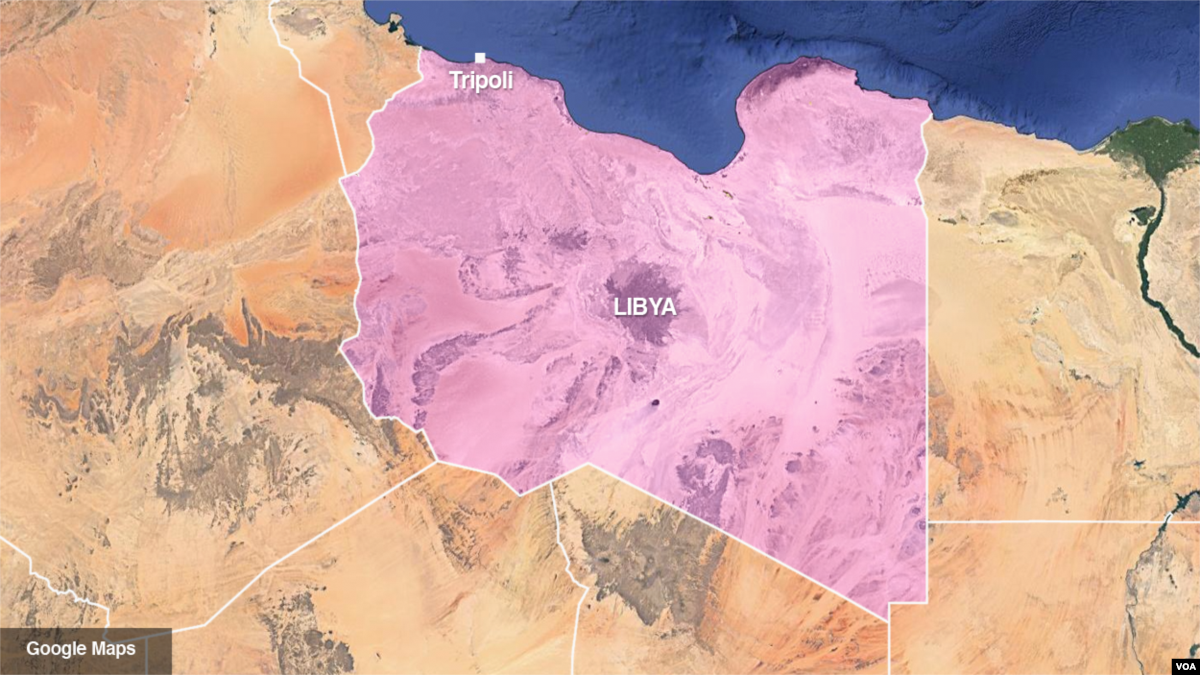
A Libyan official says militants with links to the extremist Islamic State group have killed two policemen at a checkpoint east Libya.
Security official Ahmed al-Gabiely says the attack took place early on Tuesday in the eastern town of el-Agheila when the armed men "slit a police officer's throat" and killed another in a shootout with security forces manning the checkpoint.
He says the group later attacked a police station, raised the militant Islamic black flag atop the building and burned several police and ambulance vehicles.
At least four people were reported missing after the attack.
Al-Gabiely says the group has carried out similar attacks over the past months.
Libya sank into lawlessness following a 2011 uprising that toppled and later killed a longtime dictator Moammar Gadhafi.
Egypt Hikes Natural Gas Prices by up to 75 Percent
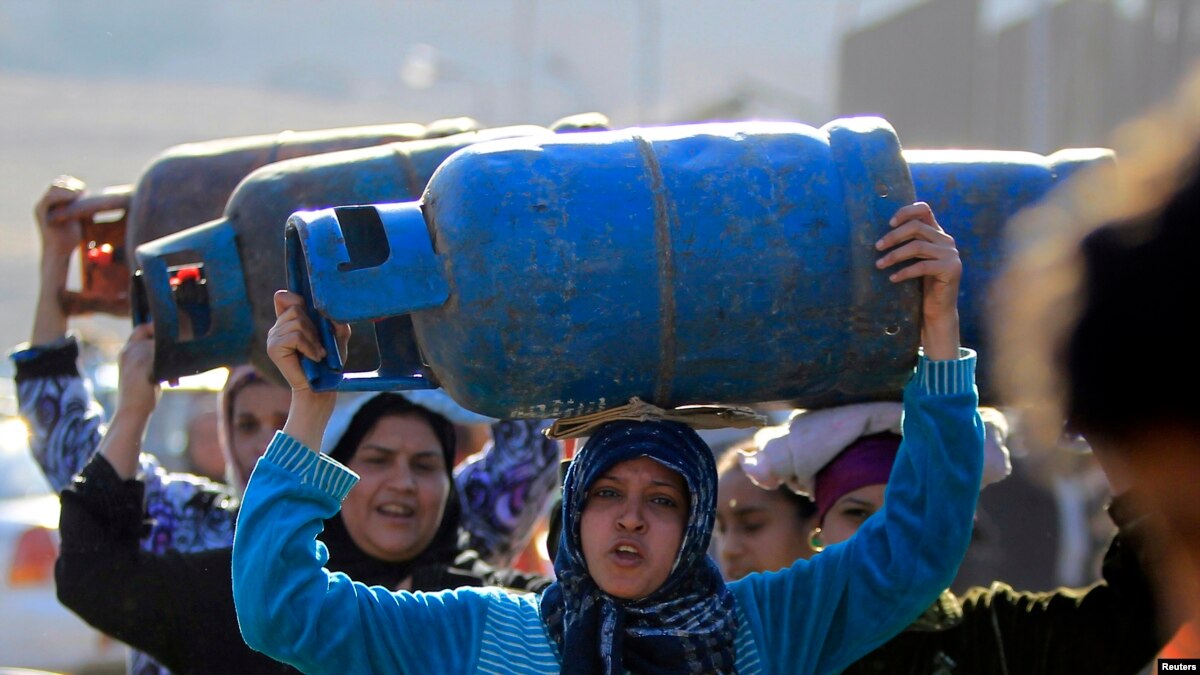
Egypt raised natural gas prices for households and businesses on Saturday by between 33.3 and 75 percent, the latest among tough austerity measures aimed at rebuilding the country’s economy battered by years of unrest since a 2011 uprising.
The government’s decision, published in the official gazette on Saturday, should come into effect starting in August. It sets the price for gas consumption of up to 30 cubic meters to 1.75 Egyptian pounds up from 1 pound per cubic meter, an increase of 75 percent.
Meanwhile, gas consumption between 30-60 cubic meters went up by 42.8 percent, from 1.75 Egyptian pounds to 2.50 pounds per cubic meter. Consumption of over 60 cubic meters was upped by 33.3 percent, from 2.25 pounds to 3.00 pounds per cubic meter.
The move is likely to further fan the flames of popular discontent, especially among poor and middle-class Egyptians who have borne the brunt of the government’s economic reform program.
In recent months, Egypt introduced its latest wave of price hikes for fuel, drinking water and electricity. It also raised the price of new cellular phone lines and monthly cellular phone bills. Charges for issuing passports and car licenses also went up steeply.
The austerity policies are part of measures taken to meet demands by the International Monetary Fund for a $12 billion bailout loan to support the government’s reform plan. Egypt secured the three-year loan in 2016.
President Abdel-Fattah el-Sissi says the reforms, he implemented after he took office in 2014, have put Egypt on “the right track” and that they will spur economic growth by over seven percent in the coming years.
He urged Egyptians to be patient with the reforms, which the government says should start benefiting citizens within two years.
Group Urges Iraq to Probe Excessive Force Used at Protests
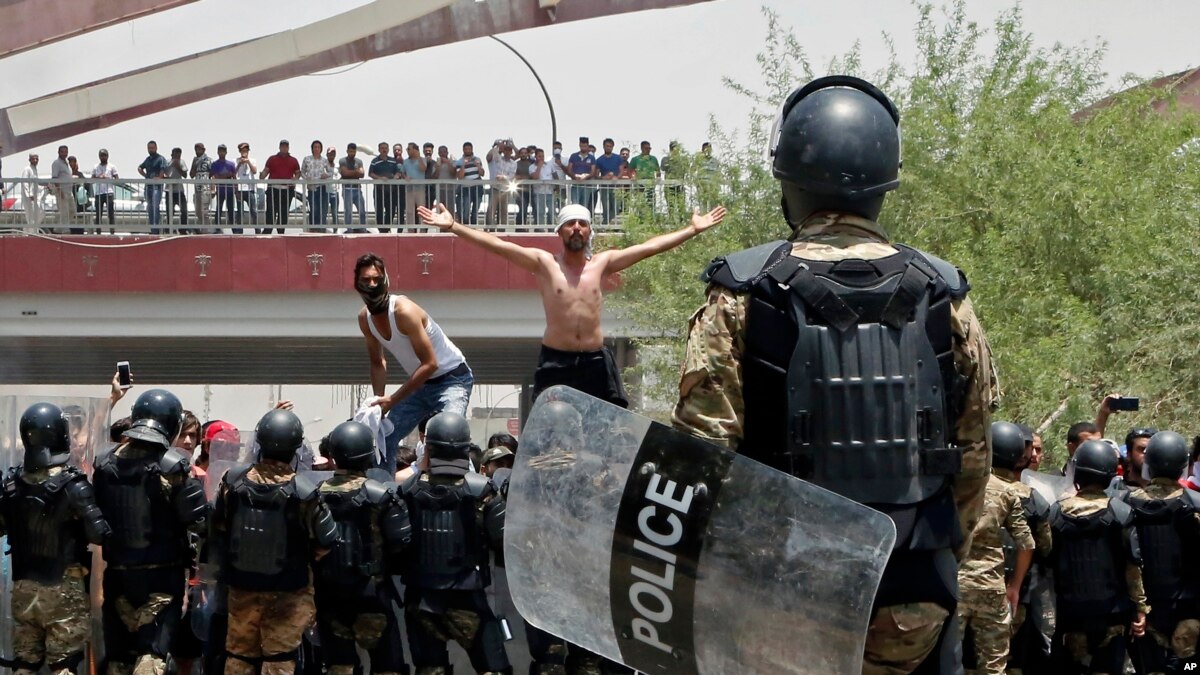
A leading international watchdog has called on the Iraqi government to investigate the excessive use of force against protesters demanding better services and jobs in the country's south.
In a report issued on Tuesday, the Human Rights Watch also urged that members of the security forces responsible for using lethal force at the rallies be disciplined or prosecuted.
Early this month, residents of oil-rich Basra province staged protests against the lack of jobs and poor services. The rallies spread to other provinces in Iraq's Shi'ite heartland.
The protests turned violent with security forces killing a number of protesters who attacked policemen and damaged government property.
HRW's Mideast chief Sarah Leah Whitson has warned that "as the government fails to address protester grievances, the danger of further bloody protests remains real."
Israeli Military Downs Syrian Warplane
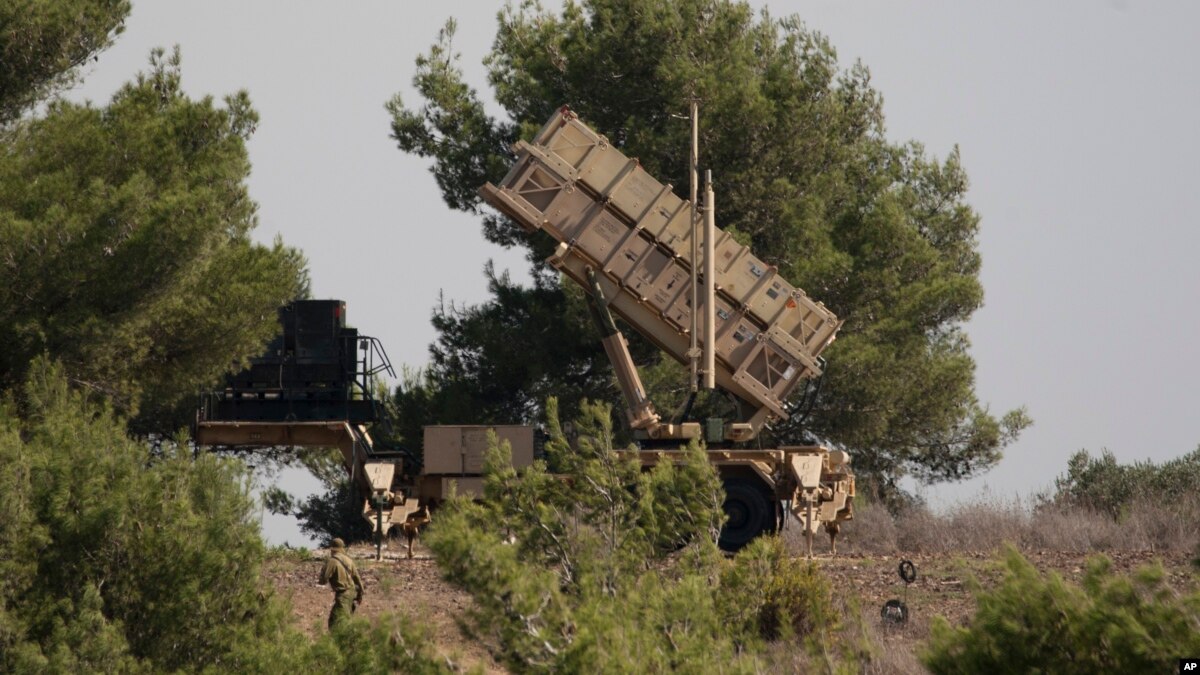
The Israeli military said it shot down a Syrian warplane Tuesday after it entered Israeli airspace.
A statement issued by the Israeli Defense Forces said it fired two Patriot interceptor missiles at the fighter jet after it crossed "into Israeli territory."
"The IDF monitored the advance of the fighter jet, which infiltrated about two kilometers into Israeli airspace," the statement said. "It was then intercepted by the Patriot missiles."
Israel's Army Radio reported said the plane was shot down over the occupied Golan Heights but may have crashed on the Syrian-controlled side of the frontier.
The army radio report said the condition of the pilot was unclear.
Syrian state media said the plane was targeted while conducting raids in Syrian airspace.
Israel seized the Golan Heights from Syria in 1967. The U.N. deployed a peacekeeping force there two years later.
Search
Featured Post
Tornado Watch for parts of Middle Georgia - wgxa.tv
[unable to retrieve full-text content] Tornado Watch for parts of Middle Georgia wgxa.tv "middle" - Google News December 30...
Postingan Populer
-
[unable to retrieve full-text content] Monroe County Middle School goes virtual next week due to COVID-19 exposure wgxa.tv "middl...
-
Members of the Meany Middle School PTSA are calling on Mayor Jenny Durkan , Seattle Parks , and City of Seattle officials to give a group...
-
The global demand for palm oil is driving the fires in Indonesia Quartz Palm oil is in your infant formula, chips, and shampoo. Develope...